Misyon Online - July-August 2007
Among The Stars
By Sr M. Elena Dioneda FMM
Death, when it comes, is always sobering, more so when it comes and takes the young. When it comes knocking, we can’t help but ask at times, ‘How could God allow such a young person to die . . . a nineteen-year-old man full of potential, talents and gifts?’ Sister Elena asks this same question and finds an answer of sorts in the belief that something greater was in store for him . . .
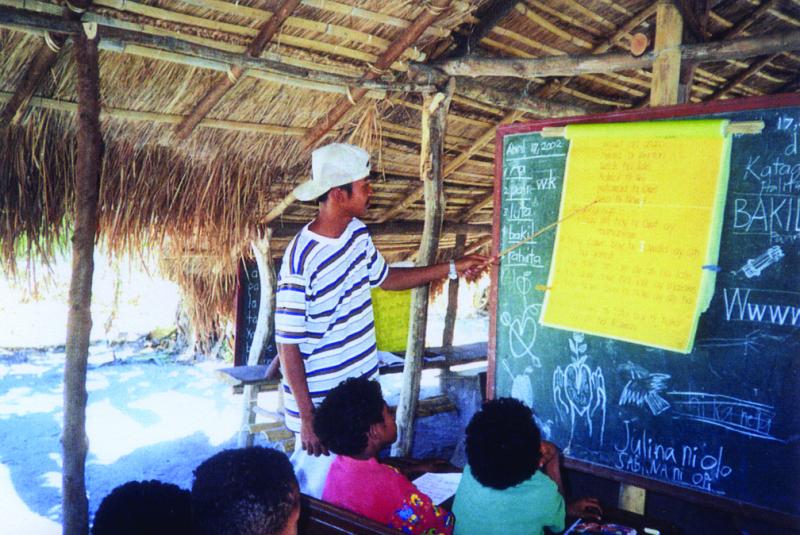
Eric Raquel was one of the Kabataan ng Itanglew I knew some years ago. He was ‘Unso’ (bunso, the youngest of eight siblings) to his family; ‘Pare’, ‘Angel’, ‘Heaven’ and ‘Puto’ (bunso) to many of his closest friends. All the while he had been doing well in his studies as a second year Electrical Engineering student in Ramon Magsaysay Technological University in Iba, Zambales. The FAPP Scholarship Program supported his college education. He was a consistent honor student in his elementary and high school years. I could say that he was a promising figure in his field. So much so that his parents and siblings considered him a symbol of hope, one who could bring fame and success to the poor and struggling family. Eric’s knack for mathematics was complemented very much by his artistic ability. This ability he considered as something of a part-time endeavor only. He had captivated many with the paintings he made on cards, streamers and frames. Each one was unique, not a copy of another. He later on ventured into charcoal painting. His first effort was a picture of his own mother, a birthday gift to her. It remains as a legacy to her.

Eric was very generous in sharing his gifts with other aspiring artists he knew. He founded card-making groups, the earnings of which support the members’ transportation and other allowances for school. Posters and streamers were made for the many church activities and celebrations through his initiative and effort. Paintings were given as gifts to the bishop, the parish priest and the coordinator of the Indigenous Peoples Apostolate (IPA), Columban Father Donal O’Dea. All were fascinated with the way he depicted nature in his paintings. They did not believe that such were products of amateur hands.
Tanglaw ng Kabataan
I prefer to call him ‘Tanglaw Tala’. He was one of the six mga tanglaw (lights) – a leader of the youth group – who had shown exemplary leadership qualities. He was a bright light to the straying youth through his encouragement and advice. He admitted that he was into the folly of youth during his high school days, but the fun and adventure had left him with many lessons. His reflections on the Word of God during the Sunday Communion Services were evidence of a spiritual person with a deep relationship with God. His favorite text: ‘Kung paanong sinugo ako ng Ama, gayon din naman, sinugo ko kayo’, ‘As the Father has sent me, so I send you’ (John 20:21). He considered this a personal call from the Lord. Like salt, he gave flavor to the life of the youth group of Itanglew – Kabataang Alay Kay Kristo (KAAKAY).
For two summers, Eric joined the youth who gave lessons in literacy to Aeta children and youth in Sitio Batea at the foot of Mount Pinatubo. Beforehand, he actively participated in the revision of the literacy modules which came from a school in Manila. He and the group who volunteered for this work revised the modules into Sambal, the language of the original inhabitants of Zambales. The finished products then became more relevant to the Aeta children and youth.
Among the Aeta children
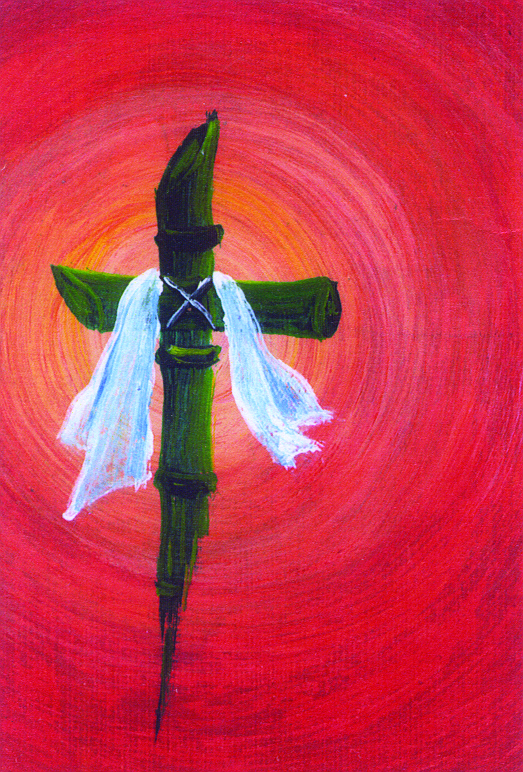
Who would even think that that summer of 2002 would be his last time in Batea? For three weeks, together with five other young college scholars of IPA, he joined the FMMs in this apostolate. Eric gave most of his time and ability to the Aeta children.
More than just a group, the Kabataan ng Itanglew became our partners in our mission to the indigenous peoples. They taught the children the basics of reading and writing in Sambal. Mind you, teaching was far from the formal school set-up. Sometimes classes were held under the trees, near streams or in any place where the children were comfortable. Eric patiently shared his time and teaching ability with these children. On one occasion he was seen by one of our Sisters crying as he was talking with his group of seven boys. He was encouraging them to go on, to continue studying and never to lose hope. He was also bidding them goodbye. They thought that Eric was simply going back to his studies in June. He still had May to spend in Batea. As Eric shared, he met all of the four objectives he had set before going to Batea. One of these was ‘Ngayon ko lang naintindihan kung ano ang misyon!’ ‘Only now do I understand what mission is!’ ‘Ang pagpunta pala sa Batea ay hindi lamang para magturo kundi upang maha-lin ang mga katutubo!’ ‘Going to Batea is not only to teach but also to love the people there!’ He really did love the Aeta!
Gone too soon
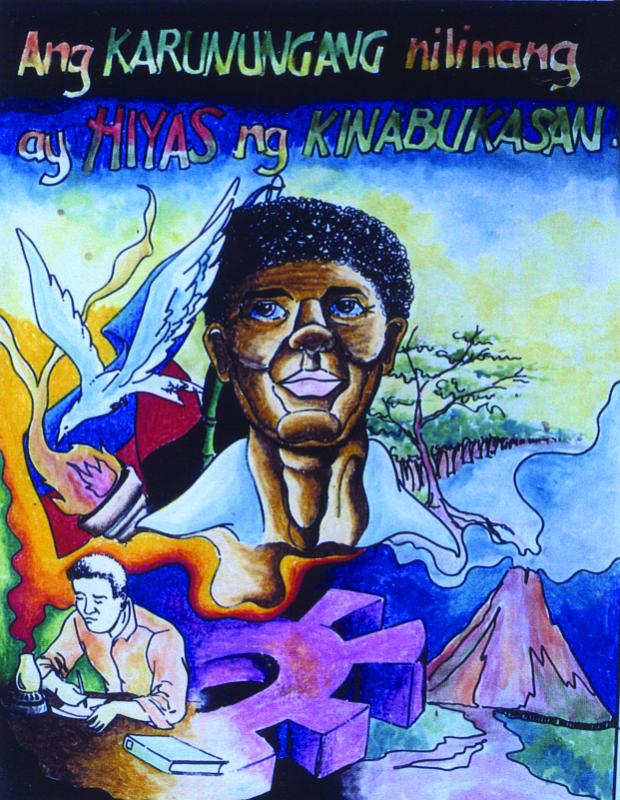
On 8 May came Eric’s first attack of an illness; no one knew till ten days later. He struggled with all those seizures, convulsions and fainting. The disease was not diagnosed immediately. The family resorted to a faith healer and even the anito healing, but to no avail. He was really sick. After three days in a hospital in Olongapo City, Eric gave up his last breath leaving behind his family, friends and loved ones in a state of shock and grief. He died of TB Meningitis. Who would ever know that the headaches he was going through were already symptoms of this terrible disease leaving him out of his mind before his death.
Now we are left only with his memories. To the rest of the Tanglaw, he was a symbol of commitment to the youth. To his family, he was a symbol of hope gone. To us Sisters, he was one of a kind . . . a big loss.
As Father O’Dea said, ‘When God takes someone, it is not because of his talents and gifts. Only God knows why he took Eric so soon. Our memories of him show us that when you’re alive, you have to be generous in sharing your gifts with others, build up people, show love, care and compassion. For who knows if you’ll be gone tomorrow’.
Every time I look at the bright star on the horizon, I remember Tanglaw Tala. I know he loved to gaze at the stars because of their different colors. Now, his light is among them . . .
Sister Elena is now working in Algeria.
You may email her at malynfmm@yahoo.com
Better Days Are Up Ahead
By ‘Maria’
The author; who sent us her full name and address, shares the deep loneliness she feels within her own family

I grew up with my beloved grand parents. Now that they’ve gone to eternity, I don’t know what kind of life to live. I feel at a loss. I’ve tried to move on living without them, but I still feel the pain of loss. I don’t understand, and I don’t want to understand why they had to leave me that early. Without them, it’s like I’m wandering in total darkness in an empty space. But I realize I still have parents to look after me. They’re here to fill the empty space caused by the absence of my dear grandparents, but unfortunately I don’t feel their presence. Honestly, I don’t want to feel that way, but deep inside me, it’s the terrible truth. Even if physically they’re with me, I still long for my grandparents’ love and care. I don’t mean that my parents don’t love and care for me, I just can’t understand why I feel that way towards them.
Maybe it’s because when I was a child, I wasn’t able to spend much time with them. They had to work away from us, and we were left in the loving care of our grandparents. I didn’t blame them for making such a decision to leave us behind because I understood they had to work hard for our family. And I also felt that their staying away from us was a big sacrifice for them too. I didn’t actually hate them but I felt very uncomfortable being with them, as though I was an alien in the family. It seemed none of my actions were good enough for their expectations so that almost everything I did was wrong.
I was in Grade V when my mother decided to give up her career and stay at home with us. In short, we were reconciled as one happy family again. I wasn’t used to living with them and that created a very big gap among us. The worst thing I could ever remember was that my mother blamed me for my grandmother’s death. I felt a dagger piercing my heart then but didn’t show my emotions. I tried to remain casual although I was deeply wounded. I knew my mother didn’t mean what she uttered but the damage was done. From that time on, my feelings towards my parents became so indifferent. I drastically drifted away to the point that I didn’t even talk to them.
I don’t want to hate them because deep inside me I do love and respect them. I want to bridge the gap and patch up any difference between us but I remain very weak. I can’t find the courage to face the situation nor show my real feelings to my parents for fear that all the more they might misunderstand me. Until now, I honestly feel the gap is still there and I’m afraid it will become worse. I know I’ve caused them so much pain because, according to my mother, I was not the child she expected me to be. I don’t want things to go on like this. I want to live a normal life, living in harmony with my family.
Much as I want to make the first move, I’m held back by fear of getting rejected. I’m afraid it might be too late for me to bridge the gap but I’m very willing to try to find a way to mend the broken pieces of my life caused by the pain of my childhood experience.
As I move towards a new phase of my life, I wish I would be able to make the right move. Soon, if God permits, I hope to pursue my college degree in Manila as my initial step in facing a new beginning. I want to study away from my parents so that I’ll get the chance to find myself. I’m not sure if this decision of mine is right. All I want to do is to make up to my dear parents and siblings for all my shortcomings and misgivings. I want them to know how much I love them and I’ll do everything to make them proud of me once again as their beloved daughter and sister. I don’t know if I’ll survive without them. But what I am sure of is that I’ll prove my worth to them. Because of my unhappy experience in childhood, I developed the fear of mingling with people. I’m afraid that everyone will reject me and I feel that I’ve nobody to come home to. I’m afraid they won’t forgive me and may hate me for all the pain and heartaches I’ve given them. But I realize I’m afraid of everything because I don’t know myself. I’m afraid to lose everyone I love and those who love me for WHO I am if there are such people.
In prayer, I’ve sought guidance from the Holy Spirit and Mother Mary to help ease the pain and let go of all the heartaches and that these be replaced with love and understanding, patience and perseverance, humility and forgiveness.
You may email ‘Maria’ at editor@misyononline.com , putting ‘For Maria’ in the subject.
Or you may write her: c/o The Editor, PO Box 588, 6100 BACOLOD CITY
Blessing Of A Large Family
by Sr Constancia V. Peña RVM
The writer is number 16, the lone survivor in a family of twenty: 12 boys and eight girls. The living descendants of her parents number more than 200 grand, great-grand, great-great-grand, great-great-great-grand, and great-great-great-great-grandchildren, five generations. Interestingly, there are ten sets of twins: one set of male and female, six sets of females and three sets of males. There was that so-called ‘baby boom’ in the fifties and sixties, but members of this large family were born in 1902 through 1930.
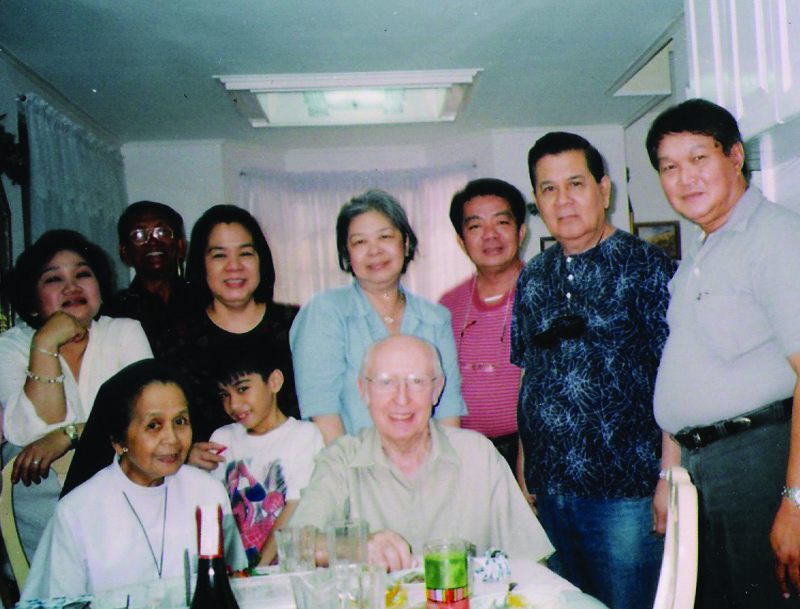
Sr Constancia with family members and Fr Kevin McHugh SSC
Being the lone survivor, I can’t keep track of all my relatives since they are scattered all over the Philippines, Canada, the USA and Europe.It is quite an experience in the Philippines that those who have large families live close to each other, and help sustain and encourage each other in times of calamity, death, accident or some tragic happening. This is a common trait among Filipinos. Children in large families are closer emotionally than children in small families. There is a notion that as children multiply, parents love them less and cannot give them the time and interest necessary for their proper development. This is a misconception. God grants the necessary grace to accept all children and love them equally.
My father, Tiburcio, was a self-employed man and my mother, Constancia Valenzuela, a housekeeper. Although we were 20 siblings, I lived to see only thirteen of us because some had died before I was born and others had gotten married and lived independently with their own families. I lived and grew up with only six of my brothers and sisters. The seven of us were the last to be born and at intervals of one to two years. Camilo was 14th, Adel 15th, Cons (myself) 16th, Pachy 17th, Angie 18th, Tancho 19th and Resty 20th.
In the beginning
My parents were parishioners of Sta Ana, grew up there and received the sacraments of Baptism and Confirmation at Sta Ana Catholic Church. On 15 August 1901 they were married there. The twenty siblings were baptized and confirmed in the same church, except the first twins who died immediately after birth.
Narciso (2nd), through his perseverance, worked while studying, became a lawyer and sent Adel (15th) and me (16th) to college. We both graduated on 19 March 1941, with Archbishop Michael O’Doherty of Manila officiating at Adel’s ceremony at St Paul’s Hospital, while I had mine at Malate Catholic Church with the Apostolic Delegate, Archbishop Guglielmo Piani SDB, presiding. We missed each other’s graduation rites. I feel nostalgic whenever I recall this wonderful event.
Sibling pride
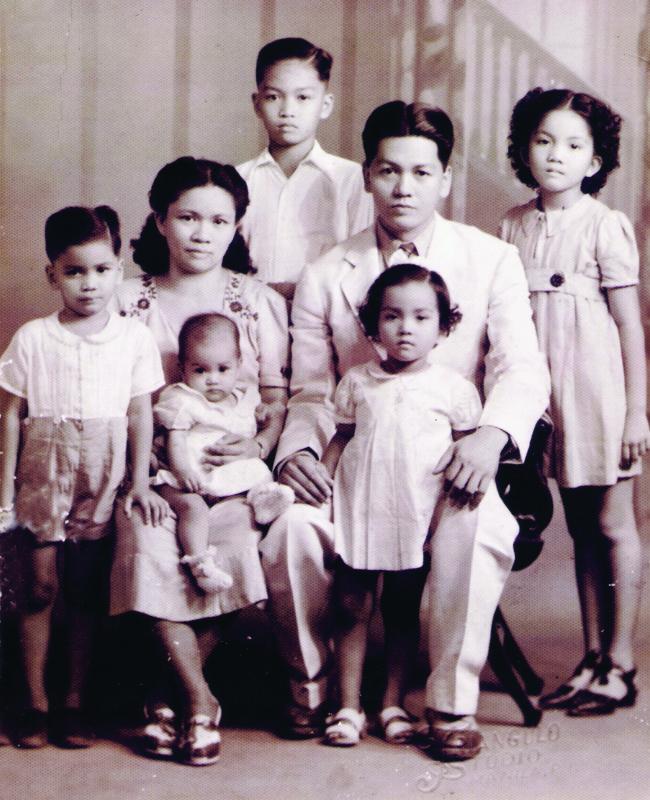
Esmeralda Peña (one of the author's brothers)
and family. He died during WWII
Narciso, all through the years, served the government at the office of the Register of Deeds, Manila. He rose from the ranks to Deputy Register and eventually put up a law office at the Madrigal Building in Escolta, while teaching part time. He went back to God on Ash Wednesday 1986 at the age of 83 after a life fully lived. My favorite brother whom I loved so much . . . a truly upright, self-made man in the true sense of the word; he was a fourth-degree Knight of Columbus.
Camilo (14th) followed in the footsteps of Narciso. Determined to be a lawyer, he worked his way through. He was a self-made man and aspired to be a criminal lawyer. He succeeded and earned his LL.B. degree. Among his clientele were financially poor people whom he did not charge for his professional services. There was a client whom he defended in court who became so excited when acquitted he suffered a fatal heart attack.
After graduation, the Maryknoll Sisters employed four of us graduates to teach at Maryknoll in Lucena from June till December 1941 when the Philippines got involved in World War II. We teachers from Manila had to leave Lucena to join our families. People in the city were just restless and seemed not to know what to do or where to go.
The war years
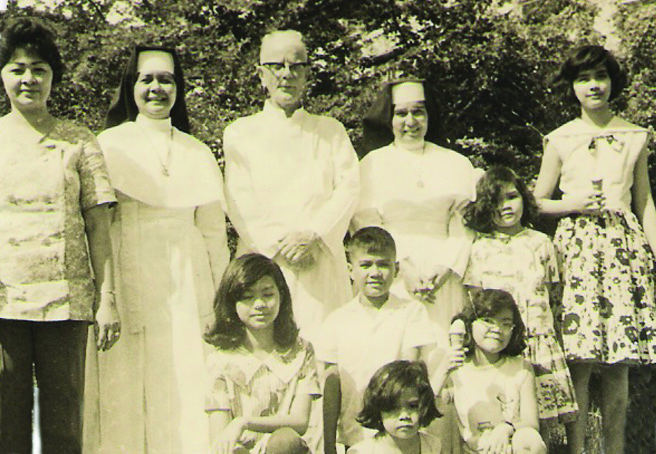
Family memories with Fr Thomas Connolly SSC
The married members of the family and their children evacuated from Manila, some to Pililla, Rizal, others to Teresa and Baras, and still others to Cavite. Four of us with our parents fled to Cardona and stayed with a friend of my father. My younger brother Tancho (19th) joined the guerilla movement in the mountains while Adel (15th) served in hospitals to minister to the wounded and the sick. It was in Cardona that we met Columban Father Arthur Price, the parish priest. [Editor’s note: Father Price, a New Zealander, came to the Philippines in 1936. Apart from a stint in Australia and New Zealand from 1948 to 1950 he spent all his time in the Philippines and died in Manila in 1996. He was interned by the Japanese in Los Baños in 1944.] I agreed to catechize the children of the parish while schools were closed. I hadn’t started when we learned that Manila was declared an ‘Open City’. So my parents decided that we should return to our house there.
Memories of war
In 9 February 1945 at high noon, Japanese soldiers stood in formation on both sides of Del Pan St in Sta Ana where we lived, all pointing their machine guns at the houses. We thought it was merely a rehearsal of the kind which they usually had, only to find out after the Liberation that they were waiting for the signal from their superior officer to open fire on the houses with all the occupants in them. My mother, a 150-lb woman, in her great fear and anxiety, aided by a burst of adrenaline, climbed the five-foot concrete wall all by herself to get to the yard of my uncle, our next-door neighbor.
I shall always remember my mother for her forte, cooking delicious Spanish dishes for us and for the families of my married sisters and brothers. Her legacy to us and to all her grandchildren is genuine mechado and morcon, our favorites among all her dishes. To this day, I hear the grandchildren speak with pride of her delicious Spanish dishes. They have even tried to cook her recipes, and not a few have been successful. How we all enjoyed and relished her cooking with its zestful flavor!
One day, tall, lanky American soldiers in fatigues swam across the Pasig River which separated Sta Ana from Mandaluyong, for the connecting bridge had been blown up by the Japanese. Upon reaching the shores of Sta Ana, they walked in single file down Del Pan St. Seeing them passing by, we rejoiced in gleeful triumph shouting at the top of our voices: ‘We are liberated! The Americans have liberated us!’
Price of liberation
At the same time this was happening, the Japanese fled with their guns from the end of Del Pan St towards Paco, Ermita, Malate and Intramuros, where the great massacre took place. In the nick of time the people of Sta Ana were saved from the Japanese. Tens of thousands were killed by the ruthless Japanese before they retreated; others were killed by friendly fire.
A touching experience
Many witnessed ‘dog-fights’ in the air between American and Japanese fighter-planes. One day at noon a US plane was shot down by the Japanese after a long ‘dog-fight’. The US pilot was shot by the Japanese several times from all directions as he parachuted so that when he touched down he was already dead. From his plane a tiny baby’s sock was carried by the wind in our direction and fell near our house. When I examined the little sock, my heart went out to the baby and his dad; I whispered a prayer for them. The pilot must have kept his baby’s sock with him all the time since he bade goodbye to his family before his departure for the Pacific War.
A family reunion
My younger brother Tancho (19th) emerged from the mountains one hot day in June after surviving with the guerillas for three years. Then 19, he was back home with bouts of malaria. It was really heartrending for the family to witness this broken young man during his nightmares and attacks of malaria. Adel, the nurse, had just married and was reunited with us. God brought them back to us and we were gratefully happy. Indeed, the war years were fraught with fear and anxiety, horror, uncertainty and unbearable agony.
The joys that are mine
This narration would not be complete if I failed to mention the happy memories and experiences at Maryknoll College in Malate, at that time the only parish for English-speakers in Manila. I relish those memories of my happy days at Maryknoll and Malate.
Although I belonged to Sta Ana parish from childhood through high school under the Spanish-speaking Franciscans (OFM), I had learned to love Malate-Maryknoll so that whenever I recall my college days at Maryknoll it is always associated with Malate, and vice versa. Malate had become my parish. The College was then located at Mabini St, opposite Romero Salas St. We used to attend Mass in Malate church, and the good Sisters would walk us there for confession on Saturday afternoons. The place is a storehouse of countless loving memories so very dear to my heart.
I shall never forget how the Columban priest-martyrs of WWII used to help us spiritually during our college years and after. I can still remember with nostalgia the very spot where I sat during the graduation rites that sunny afternoon of March 1941 with Archbishop Piani officiating. I recall with kind affection the good Columban priests, the spiritual anchors I had, who touched my life in their respective generations: Fr Thomas Connolly, Fr Arthur Price and Fr Kevin McHugh. No wonder some of my sisters used to dub me ‘a Columban girl’.
On 27 April 1990, 49 years later, the Providence of God brought this ‘Columban girl’ to Malate Catholic School where she worked happily to her heart’s content for ten successive years in the guidance department.
Guiding others
The best ten years of my religious life – fruitful, enriching, fulfilling – were spent in Malate. The work at the Center was joy for me. The ‘helping profession’ apostolate is always a joy. You want to care, to help people and when they are open, responsive and receptive, you experience a kind of inner joy which no one can take away from you. It leaves a warm, happy feeling in the hearts of those whom you have helped. Meeting various types of personalities from time to time is both enriching and challenging. You learn from them and they learn from you . . . like lessons taught behind-the-scenes. Indeed, the work is very rewarding.
My beloved’s call
It is not uncommon in the Philippines that when a member of the family decides to leave home in order to become a religious or a priest, the parents show opposition. This has changed since Vatican II.
In my case from postulancy, through the novitiate, to first profession of vows, my mother and I were poles apart. At the end of my five-year juniorate before my perpetual profession, I decided to change my religious name, as many Sisters do, from my baptismal name, Conrada, to that of my mother, Constancia. Upon learning this and with the help of my prayers, her heart was softened and in May 1956 I was in for a big, pleasant surprise . . . she came to greet me at this very joyful moment of my perpetual profession. My happiness was complete!
It is worth noting that whenever a death occurred in the family I would request Father Arthur Price during his time, as I do now Father Kevin McHugh, if he’s available, to celebrate the Funeral Mass and read the Prayers of Commendation at the Sta Ana church mortuary. Consequently, we have adopted Father McHugh as the quasi-chaplain of the Peña family.
Where to from here
At this point in my religious life, my ministry is no longer in the active school apostolate; instead it is the Ministry of Presence and Prayer at the RVM Motherhouse where I am peacefully happy. My personal vision is for a joyful and discerning community like that of the foundational community of our foundress, Mother Ignacia del Espiritu Santo; and my mission is fidelity in my prayer-life, seeking and doing the will of God in all things as I commit myself to grow as a contemplative in action, so that I can help contribute towards the transformation of society.
Being the lone survivor, I can’t
keep track of all my relatives since they are scattered all over the Philippines, Canada, the USA and Europe.
It is quite an experience in the Philippines that those who have large families live close to each other, and help sustain and encourage each other in times of calamity, death, accident or some tragic happening. This is a common trait among Filipinos. Children in large families are closer emotionally than children in small families. There is a notion that as children multiply, parents love them less and cannot give them the time and interest necessary for their proper development. This is a misconception. God grants the necessary grace to accept all children and love them equally.
My father, Tiburcio, was a self-employed man and my mother, Constancia Valenzuela, a housekeeper. Although we were 20 siblings, I lived to see only thirteen of us because some had died before I was born and others had gotten married and lived independently with their own families. I lived and grew up with only six of my brothers and sisters. The seven of us were the last to be born and at intervals of one to two years. Camilo was 14th, Adel 15th, Cons (myself) 16th, Pachy 17th, Angie 18th, Tancho 19th and Resty 20th.
In the beginning
My parents were parishioners of Sta Ana, grew up there and received the sacraments of Baptism and Confirmation at Sta Ana Catholic Church. On 15 August 1901 they were married there. The twenty siblings were baptized and confirmed in the same church, except the first twins who died immediately after birth.
Narciso (2nd), through his perseverance, worked while studying, became a lawyer and sent Adel (15th) and me (16th) to college. We both graduated on 19 March 1941, with Archbishop Michael O’Doherty of Manila officiating at Adel’s ceremony at St Paul’s Hospital, while I had mine at Malate Catholic Church with the Apostolic Delegate, Archbishop Guglielmo Piani SDB, presiding. We missed each other’s graduation rites. I feel nostalgic whenever I recall this wonderful event.
Sibling pride
Narciso, all through the years, served the government at the office of the Register of Deeds, Manila. He rose from the ranks to Deputy Register and eventually put up a law office at the Madrigal Building in Escolta, while teaching part time. He went back to God on Ash Wednesday 1986 at the age of 83 after a life fully lived. My favorite brother whom I loved so much . . . a truly upright, self-made man in the true sense of the word; he was a fourth-degree Knight of Columbus.
Camilo (14th) followed in the footsteps of Narciso. Determined to be a lawyer, he worked his way through. He was a self-made man and aspired to be a criminal lawyer. He succeeded and earned his LL.B. degree. Among his clientele were financially poor people whom he did not charge for his professional services. There was a client whom he defended in court who became so excited when acquitted he suffered a fatal heart attack.
After graduation, the Maryknoll Sisters employed four of us graduates to teach at Maryknoll in Lucena from June till December 1941 when the Philippines got involved in World War II. We teachers from Manila had to leave Lucena to join our families. People in the city were just restless and seemed not to know what to do or where to go.
The war years
The married members of the family and their children evacuated from Manila, some to Pililla, Rizal, others to Teresa and Baras, and still others to Cavite. Four of us with our parents fled to Cardona and stayed with a friend of my father. My younger brother Tancho (19th) joined the guerilla movement in the mountains while Adel (15th) served in hospitals to minister to the wounded and the sick. It was in Cardona that we met Columban Father Arthur Price, the parish priest. [Editor’s note: Father Price, a New Zealander, came to the Philippines in 1936. Apart from a stint in Australia and New Zealand from 1948 to 1950 he spent all his time in the Philippines and died in Manila in 1996. He was interned by the Japanese in Los Baños in 1944.] I agreed to catechize the children of the parish while schools were closed. I hadn’t started when we learned that Manila was declared an ‘Open City’. So my parents decided that we should return to our house there.
Memories of war
In 9 February 1945 at high noon, Japanese soldiers stood in formation on both sides of Del Pan St in Sta Ana where we lived, all pointing their machine guns at the houses. We thought it was merely a rehearsal of the kind which they usually had, only to find out after the Liberation that they were waiting for the signal from their superior officer to open fire on the houses with all the occupants in them. My mother, a 150-lb woman, in her great fear and anxiety, aided by a burst of adrenaline, climbed the five-foot concrete wall all by herself to get to the yard of my uncle, our next-door neighbor.
I shall always remember my mother for her forte, cooking delicious Spanish dishes for us and for the families of my married sisters and brothers. Her legacy to us and to all her grandchildren is genuine mechado and morcon, our favorites among all her dishes. To this day, I hear the grandchildren speak with pride of her delicious Spanish dishes. They have even tried to cook her recipes, and not a few have been successful. How we all enjoyed and relished her cooking with its zestful flavor!
One day, tall, lanky American soldiers in fatigues swam across the Pasig River which separated Sta Ana from Mandaluyong, for the connecting bridge had been blown up by the Japanese. Upon reaching the shores of Sta Ana, they walked in single file down Del Pan St. Seeing them passing by, we rejoiced in gleeful triumph shouting at the top of our voices: ‘We are liberated! The Americans have liberated us!’
Price of liberation
At the same time this was happening, the Japanese fled with their guns from the end of Del Pan St towards Paco, Ermita, Malate and Intramuros, where the great massacre took place. In the nick of time the people of Sta Ana were saved from the Japanese. Tens of thousands were killed by the ruthless Japanese before they retreated; others were killed by friendly fire.
A touching experience
Many witnessed ‘dog-fights’ in the air between American and Japanese fighter-planes. One day at noon a US plane was shot down by the Japanese after a long ‘dog-fight’. The US pilot was shot by the Japanese several times from all directions as he parachuted so that when he touched down he was already dead. From his plane a tiny baby’s sock was carried by the wind in our direction and fell near our house. When I examined the little sock, my heart went out to the baby and his dad; I whispered a prayer for them. The pilot must have kept his baby’s sock with him all the time since he bade goodbye to his family before his departure for the Pacific War.
A family reunion
My younger brother Tancho (19th) emerged from the mountains one hot day in June after surviving with the guerillas for three years. Then 19, he was back home with bouts of malaria. It was really heartrending for the family to witness this broken young man during his nightmares and attacks of malaria. Adel, the nurse, had just married and was reunited with us. God brought them back to us and we were gratefully happy. Indeed, the war years were fraught with fear and anxiety, horror, uncertainty and unbearable agony.
The joys that are mine
This narration would not be complete if I failed to mention the happy memories and experiences at Maryknoll College in Malate, at that time the only parish for English-speakers in Manila. I relish those memories of my happy days at Maryknoll and Malate.
Although I belonged to Sta Ana parish from childhood through high school under the Spanish-speaking Franciscans (OFM), I had learned to love Malate-Maryknoll so that whenever I recall my college days at Maryknoll it is always associated with Malate, and vice versa. Malate had become my parish. The College was then located at Mabini St, opposite Romero Salas St. We used to attend Mass in Malate church, and the good Sisters would walk us there for confession on Saturday afternoons. The place is a storehouse of countless loving memories so very dear to my heart.
I shall never forget how the Columban priest-martyrs of WWII used to help us spiritually during our college years and after. I can still remember with nostalgia the very spot where I sat during the graduation rites that sunny afternoon of March 1941 with Archbishop Piani officiating. I recall with kind affection the good Columban priests, the spiritual anchors I had, who touched my life in their respective generations: Fr Thomas Connolly, Fr Arthur Price and Fr Kevin McHugh. No wonder some of my sisters used to dub me ‘a Columban girl’.
On 27 April 1990, 49 years later, the Providence of God brought this ‘Columban girl’ to Malate Catholic School where she worked happily to her heart’s content for ten successive years in the guidance department.
Guiding others
The best ten years of my religious life – fruitful, enriching, fulfilling – were spent in Malate. The work at the Center was joy for me. The ‘helping profession’ apostolate is always a joy. You want to care, to help people and when they are open, responsive and receptive, you experience a kind of inner joy which no one can take away from you. It leaves a warm, happy feeling in the hearts of those whom you have helped. Meeting various types of personalities from time to time is both enriching and challenging. You learn from them and they learn from you . . . like lessons taught behind-the-scenes. Indeed, the work is very rewarding.
My beloved’s call
It is not uncommon in the Philippines that when a member of the family decides to leave home in order to become a religious or a priest, the parents show opposition. This has changed since Vatican II.
In my case from postulancy, through the novitiate, to first profession of vows, my mother and I were poles apart. At the end of my five-year juniorate before my perpetual profession, I decided to change my religious name, as many Sisters do, from my baptismal name, Conrada, to that of my mother, Constancia. Upon learning this and with the help of my prayers, her heart was softened and in May 1956 I was in for a big, pleasant surprise . . . she came to greet me at this very joyful moment of my perpetual profession. My happiness was complete!
It is worth noting that whenever a death occurred in the family I would request Father Arthur Price during his time, as I do now Father Kevin McHugh, if he’s available, to celebrate the Funeral Mass and read the Prayers of Commendation at the Sta Ana church mortuary. Consequently, we have adopted Father McHugh as the quasi-chaplain of the Peña family.
Where to from here
At this point in my religious life, my ministry is no longer in the active school apostolate; instead it is the Ministry of Presence and Prayer at the RVM Motherhouse where I am peacefully happy. My personal vision is for a joyful and discerning community like that of the foundational community of our foundress, Mother Ignacia del Espiritu Santo; and my mission is fidelity in my prayer-life, seeking and doing the will of God in all things as I commit myself to grow as a contemplative in action, so that I can help contribute towards the transformation of society.
Sister Constancia lives at:
Religious of the
Virgin Mary Motherhouse,
214 N. Domingo St, Cubao,
1111 QUEZON CITY.
The website of the RVMs is www.rvmonline.net
Coming To The Light
By Father Garry Gestoveo
Father Garry Gestoveo, from Victorias City, Negros Occidental, joined the CICMs in 1990 and was sent to Japan in 2000. Ordained in 2004, he is the assistant parish priest of Fukuyama Church in the Diocese of Hiroshima, Japan.
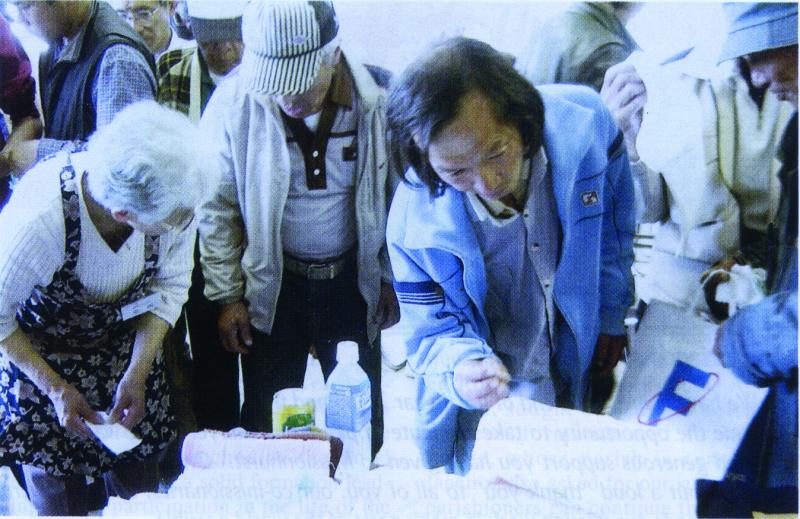
Volunteers hold a distribution of towels
and clothing for the winter season
The evening that I arrived in my newly assigned parish of Fukuyama Church, Diocese of Hiroshima, I met Sister Marie Lisa of the Sisters of Mary Auxiliary. She was in the kitchen of the church along with a number of other people. They were preparing o-nigiri (rice balls) and miso-shiru (miso soup). I was new to the church, so I just assumed they were all parishioners of the church. They were so friendly, welcoming and warm to me. Only later when Sister Marie Lisa talked to me about the nature of their activity did I learn that they were volunteers comprised of many different faiths and backgrounds. They were engaged in preparing a dinner for the homeless in the area.
Tomoshibi Kai
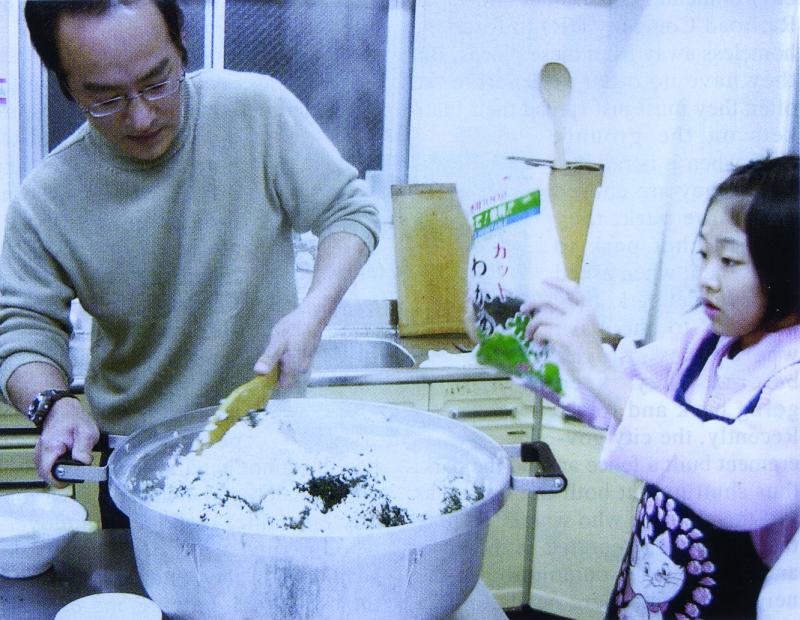
Father and daughter team up in kind service to the homeless
The volunteers I met that first night were members of the Fukuyama Church Welfare Group, and they had taken the name Tomoshibi Kai. Tomoshibi, in Japanese, means light, or lamp. The group is made up mostly of volunteers from the YMCA school of social service department, certified social workers, volunteers from the City’s Public Assistance Committee, a few Catholics from the parish and a volunteer from the Himawari (Sunflower) Kai that belongs to the Protestant Church. Tomoshibi Kai was formed twelve years ago in Fukuyama Church as a social welfare committee that responds to needs of the homeless in the area.
In giving me some background on the group, Sister Marie Lisa told me that from 1990-2000 she dealt with twenty to twenty-five homeless people. But their numbers have increased and presently, there are about sixty people, including eleven women. Until 2002, the majority of the homeless had been middle-aged males. In 2003, volunteers’ ages ranged from 19 to 70 years old. This range in age is a national phenomenon. The increase in numbers is considered to be due to a rise in unemployment and bankruptcy, a decline in job opportunities and the break-up of families.
Plight of the homeless
The homeless people here, like elsewhere, can be found in the parks, at riversides, bus stops, underground passages, bicycle ports and railroad bridges. In the morning, some go to the train station that opens at 4am and they stay there until it closes at 10pm; then they need to look for a place to sleep again. Complaints from the people of the neighborhood lead the city’s environmental department and Japan Railroad Company (JR) to force the homeless away from these places. But they have no other alternative, so often they just spread their blankets on the ground, even when it is raining. When they are chased out of the park, they find another park to stay in. Then when asked to leave that park, they go back to the park where they stayed before. They keep going back and forth. Recently, the city government built a fence around the park, thus shutting out both the homeless and the children who wanted to play there. This was reported in the news and caused some commotion in the neighborhood. There needs to be a balance. The homeless have to reconsider the manner in which they use the public facilities, and the neighborhood has to understand the needs of the homeless.
The homeless’ situation
Homeless people encounter a lot of difficulties. It is difficult to secure a job through public employment security offices, where most candidates have a proper address and health insurance. As most of the work that is available requires physical strength, (shipyard labor, for example, where the workload is heavy), a 55-year-old person of marginal health cannot handle such a job. And unfortunately, the homeless occasionally encounter dishonest employers who hire under practices that take advantage of their situation: charging them for food, lodging and bathing, which leaves them with no earnings at the end of the contract. Some are even hired to do construction work and when the job is complete, they are chased off without receiving any pay. It is very difficult for the Department of Labor to do anything about these working conditions.
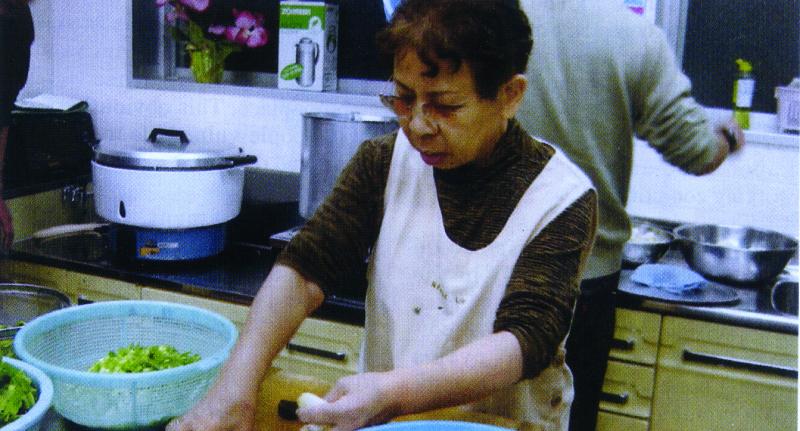
Sr Marie Lisa preparing the bowls for food distribution
Some of the homeless used to go around the city very early in the morning to find empty beer – and juice – cans, selling them to shops that collect aluminum. But even that is a waning option since the city government prohibited individual collection of cans and newspapers. They would get 700 yen (less than P300) for 10 kilograms of cans. It takes days to collect that many cans, so with one rice ball costing about P50, you can see that the reward for their effort is minimal.
With most homeless living without regular income or no income at all, picking up food thrown out by restaurants or convenience stores is commonplace. This obviously makes these people vulnerable to many illnesses and diseases.
The government, through its Livelihood Protection Office, grants financial aid to the needy especially to those who are sick. Yet, in order to be eligible, they must have a proper address and a letter from the doctor to prove that they are in need of money for medical purposes. A guarantor is often required to secure an apartment, but most families of the homeless refuse to serve as one. The volunteers of Tomoshibi Kai try to find shelter for the sick, but inexpensive apartments are hard to come by.
Ray of hope
One spot of hope has emerged though: The Livelihood Protection Office held some meetings with the volunteers of Tomoshibi Kai, in order to exchange opinions regarding the situation of the homeless. Subsequently, some of the officers participated in the nightly distribution of rice and soup to find out more closely about their actual living conditions. A doctor who conducts free medical check-ups for the homeless in Tokyo lent his experience in one of the seminars aimed at building positive attitudes towards the homeless.
For my part, after talking with my parish priest, I decided to join the volunteers in cooking and distributing the soup and rice on Sunday evenings. This kind of work opens a lot of possibilities for contact not only with the homeless, but also with people of this church and of the area where I live. I enjoy the company of the volunteers, who are very dedicated to their mission. Indeed, as the name of the groups suggests, they are bringing light to people who are neglected in society. At the same time, they bring light to people who have closed their hearts to the homeless. Although there are only a few parishioners who join the cooking and distribution, many make an effort to share contributions of rice to the Tomoshibi Kai. We have put up a box to collect funds for the food for Sunday distribution. Though our response seems small compared to the enormous needs, I am very hopeful that more people will come to the light, and begin to open their hearts to the homeless.
You may email Father Garry at gani2003@hotmail.comor write him at: Fukuyama Church, Shôwa-chô 7-26, FUKUYAMA 720-0208, JAPAN
Ethics And Climate Change
By Fr Seán McDonagh
The author, a Columban, came to the Philippines in 1969 and spent many years in Mindanao, including a long period with the T’bolis. He is now based in Ireland and has written a number of acclaimed books on environmental issues. The Higher Education and Training Awards Council (HETAC), the qualifications awarding body for third-level educational and training institutions outside the university sector in Ireland, awarded a Doctorate of Philosophy to Father McDonagh on the basis of his published work. His latest book, Climate Change: the Challenge to All of Us, was published by The Columba Press, <www.columba.ie>, Ireland, last year.
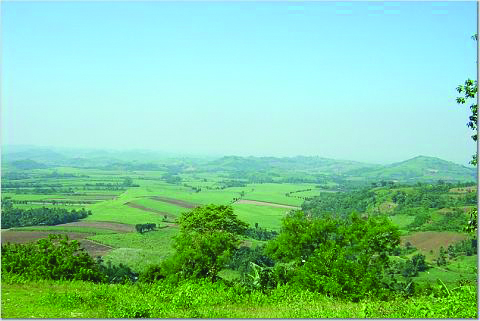
Climate change is one of the most serious ethical issues facing humanity in the 21st century. The facts speak for themselves. Global warming is melting glaciers in China’s Tibetan region at a rate of seven percent annually, triggering drought, desertification and sandstorms in other regions of China and beyond. If they disappear where will the 250 million people who depend on their melt-waters get water during the dry season? The water supply for the cities of Lima in Peru and Santiago in Chile also depends on melt waters from glaciers in the Andes. Australia is now in the midst of a 1000-year drought which is, most probably, due to global warming. Will there be enough water to support the population of Perth or Sydney? A rise of one meter in the sea level as a result of climate change would make it impossible for over 30 million Bangladeshis to live in the delta area. A significant rise in sea-levels will inundate many of the cities of the world and create a torrent of environment refugees.
What the scientists say
The chief scientist to the British government, Sir David King, believes that climate change is a greater threat to humanity and the earth than terrorism. Another scientist, Sir John Haughton, has characterized it as a weapon of mass destruction. In a report commissioned by the British government, Sir Nicholas Stern, a former chief economist with the World Bank, has stated that global warming is the greatest failure ever of market economics. According to him, if we tackle it now by lessening our dependence on fossil fuel, it will only cost about one percent of the global gross domestic product (GDP). If we leave it for another ten or fifteen years it could cost in the region of five percent to twenty percent of global GDP. Behind these figures lies not just the death of possibly hundreds of millions of people, but the fact that the earth will be a less hospitable place to live in for each succeeding generation of humans.
An ethical issue
Beyond the realm of science and economics, climate change is above all an ethical issue. For us missionaries, the Columban commitment to ecological justice springs from an ethical and religious base – the Gospel of Jesus. We are not scientists, though we try to use the best scientific information available when we discuss ecological issues as diverse as genetic engineering, patenting living organisms, nuclear power and now climate change. I was an observer at the UN Climate Change conference at Nairobi in November 2006. I noticed that almost all the negotiations around climate change quoted scientific, political and economic data but seldom mentioned the core ethical values involved in destructive human activities like emitting greenhouse gases. This is a shame because many profound ethical questions can be obscured by scientific and economic arguments about various climate change proposals. Unless ethical arguments are addressed, individual nations will continue to seek their short-term economic gain no matter how this affects the global common good, especially that of poorer countries.
Ethical principles involved
One of the first ethical principles that needs to be invoked is that those responsible for causing harm should be held responsible for their actions, and should take steps to undo the harm they had caused. If, for example, I made a habit of dumping all my waste into my neighbors’ garden which made it impossible for them to live there, I am sure that reasonable people would come to a number of conclusions very quickly. Firstly, that what I was doing was wrong. Secondly, that my excuse that it was necessary for my economic growth would be unacceptable. Thirdly, that I should desist immediately. Fourthly, that I should pay compensation for the wrong I had done.
In the case of those countries that are mainly responsible for the pollution caused by greenhouse gas emissions however, this simple ethical framework appears not to apply. The biggest polluters are loath to admit that what they are doing is either harmful or wrong; they continue to argue that even if some harm is done it is somehow necessary for economic growth; and even those who admit to a problem, like Ireland and Great Britain, think that it is acceptable to continue without radical change to our way of doing things by the simple expedient of paying poorer countries off through the carbon credit scheme. As regards the obligation to compensate for harm caused, in a spirit of global solidarity, polluting countries should make resources and new technologies available to poor communities so that those countries can achieve a decent standard of living without adopting the polluting Western model of development.
Promoting sustainable development
When it comes to allocating global emissions among nations, the polluter-pays principle is consistent with the demands of distributive justice. This means that there is an ethical imperative on every nation to reduce their carbon emissions and to promote sustainable development policies.
Some countries have claimed that the scientific causes of climate change are still uncertain; they use this as an excuse to avoid cutting their greenhouse gas emissions. Petrochemical corporations, especially Exxon-Mobile, have played a very negative role in trying to persuade people that climate change is not due to burning fossil fuel. At this point in time there is a great deal of scientific consensus about both the causes and the negative effects of global warming.
No Salvation in Technology
Listening to some of the delegates at the Nairobi conference, especially those from the USA, Australia and Russia, one would think that new technologies will solve all our problems. No adequate technology exists at present to contain or reverse climate change. The only way to proceed at the moment is to reduce our dependence on fossil fuel. The International Panel on Climate Change, which brings together the expertise of thousands of scientists from all over the world, believes that we need to reduce our greenhouse gas emissions by 60 to 80 percent by the year 2030.
Our challenge as Christians
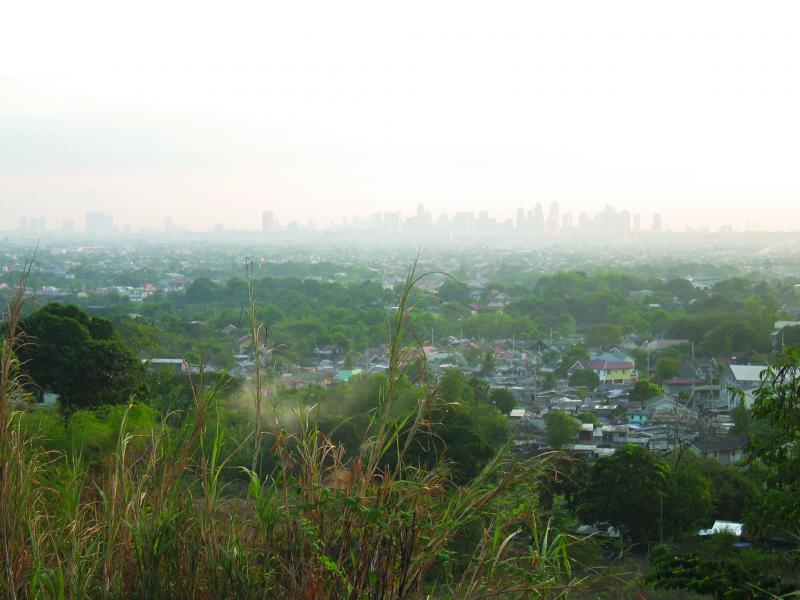
On the theological level, as Christians, we are called to care for God’s creation. Climate change is upsetting the natural cycles upon which God’s creation – animals, plants and humans – depends. Sometimes we forget that humans depend on the natural world for almost everything. Our faith calls us to care for others, especially those who are most vulnerable. We know that climate change will have a terrible impact on the poor, the very people who did least to cause the problem in the first place. Each generation is called to hand on to the next generation a world as fruitful and as beautiful as the one they inherited from their parents and grandparents. The full impact of climate change will take decades and maybe centuries to become fully apparent. But future generations will not thank us for making their world a less hospitable place for them to live in.
Unfortunately, the Catholic Church in its official statements and its development agencies has not shown adequate leadership in educating people about the moral implications of climate change up to the present time.
The Australian Church is an exception. The Bishops Committee for Justice, Development, Ecology and Peace published an excellent document called Climate Change: Our Responsibility to Sustain God’s Earth <www.catholicearthcareoz.net/POSITION_PAPER.html> in November 2005. The main drafter of that document was Columban Fr Charles Rue. The time has come for us to face up to climate change as among the most serious ethical issues that face us as Christians.
Climate change is one of the most serious ethical issues facing humanity in the 21st century. The facts speak for themselves. Global warming is melting glaciers in China’s Tibetan region at a rate of seven percent annually, triggering drought, desertification and sandstorms in other regions of China and beyond. If they disappear where will the 250 million people who depend on their melt-waters get water during the dry season? The water supply for the cities of Lima in Peru and Santiago in Chile also depends on melt waters from glaciers in the Andes. Australia is now in the midst of a 1000-year drought which is, most probably, due to global warming. Will there be enough water to support the population of Perth or Sydney? A rise of one meter in the sea level as a result of climate change would make it impossible for over 30 million Bangladeshis to live in the delta area. A significant rise in sea-levels will inundate many of the cities of the world and create a torrent of environment refugees.
What the scientists say
The chief scientist to the British government, Sir David King, believes that climate change is a greater threat to humanity and the earth than terrorism. Another scientist, Sir John Haughton, has characterized it as a weapon of mass destruction. In a report commissioned by the British government, Sir Nicholas Stern, a former chief economist with the World Bank, has stated that global warming is the greatest failure ever of market economics. According to him, if we tackle it now by lessening our dependence on fossil fuel, it will only cost about one percent of the global gross domestic product (GDP). If we leave it for another ten or fifteen years it could cost in the region of five percent to twenty percent of global GDP. Behind these figures lies not just the death of possibly hundreds of millions of people, but the fact that the earth will be a less hospitable place to live in for each succeeding generation of humans.
An ethical issue
Beyond the realm of science and economics, climate change is above all an ethical issue. For us missionaries, the Columban commitment to ecological justice springs from an ethical and religious base – the Gospel of Jesus. We are not scientists, though we try to use the best scientific information available when we discuss ecological issues as diverse as genetic engineering, patenting living organisms, nuclear power and now climate change. I was an observer at the UN Climate Change conference at Nairobi in November 2006. I noticed that almost all the negotiations around climate change quoted scientific, political and economic data but seldom mentioned the core ethical values involved in destructive human activities like emitting greenhouse gases. This is a shame because many profound ethical questions can be obscured by scientific and economic arguments about various climate change proposals. Unless ethical arguments are addressed, individual nations will continue to seek their short-term economic gain no matter how this affects the global common good, especially that of poorer countries.
Ethical principles involved
One of the first ethical principles that needs to be invoked is that those responsible for causing harm should be held responsible for their actions, and should take steps to undo the harm they had caused. If, for example, I made a habit of dumping all my waste into my neighbors’ garden which made it impossible for them to live there, I am sure that reasonable people would come to a number of conclusions very quickly. Firstly, that what I was doing was wrong. Secondly, that my excuse that it was necessary for my economic growth would be unacceptable. Thirdly, that I should desist immediately. Fourthly, that I should pay compensation for the wrong I had done.
In the case of those countries that are mainly responsible for the pollution caused by greenhouse gas emissions however, this simple ethical framework appears not to apply. The biggest polluters are loath to admit that what they are doing is either harmful or wrong; they continue to argue that even if some harm is done it is somehow necessary for economic growth; and even those who admit to a problem, like Ireland and Great Britain, think that it is acceptable to continue without radical change to our way of doing things by the simple expedient of paying poorer countries off through the carbon credit scheme. As regards the obligation to compensate for harm caused, in a spirit of global solidarity, polluting countries should make resources and new technologies available to poor communities so that those countries can achieve a decent standard of living without adopting the polluting Western model of development.
Promoting sustainable development
When it comes to allocating global emissions among nations, the polluter-pays principle is consistent with the demands of distributive justice. This means that there is an ethical imperative on every nation to reduce their carbon emissions and to promote sustainable development policies.
Some countries have claimed that the scientific causes of climate change are still uncertain; they use this as an excuse to avoid cutting their greenhouse gas emissions. Petrochemical corporations, especially Exxon-Mobile, have played a very negative role in trying to persuade people that climate change is not due to burning fossil fuel. At this point in time there is a great deal of scientific consensus about both the causes and the negative effects of global warming.
No Salvation in Technology
Listening to some of the delegates at the Nairobi conference, especially those from the USA, Australia and Russia, one would think that new technologies will solve all our problems. No adequate technology exists at present to contain or reverse climate change. The only way to proceed at the moment is to reduce our dependence on fossil fuel. The International Panel on Climate Change, which brings together the expertise of thousands of scientists from all over the world, believes that we need to reduce our greenhouse gas emissions by 60 to 80 percent by the year 2030.
Our challenge as Christians
On the theological level, as Christians, we are called to care for God’s creation. Climate change is upsetting the natural cycles upon which God’s creation – animals, plants and humans – depends. Sometimes we forget that humans depend on the natural world for almost everything. Our faith calls us to care for others, especially those who are most vulnerable. We know that climate change will have a terrible impact on the poor, the very people who did least to cause the problem in the first place. Each generation is called to hand on to the next generation a world as fruitful and as beautiful as the one they inherited from their parents and grandparents. The full impact of climate change will take decades and maybe centuries to become fully apparent. But future generations will not thank us for making their world a less hospitable place for them to live in.
Unfortunately, the Catholic Church in its official statements and its development agencies has not shown adequate leadership in educating people about the moral implications of climate change up to the present time.
The Australian Church is an exception. The Bishops Committee for Justice, Development, Ecology and Peace published an excellent document called Climate Change: Our Responsibility to Sustain God’s Earth <www.catholicearthcareoz.net/POSITION_PAPER.html> in November 2005. The main drafter of that document was Columban Fr Charles Rue. The time has come for us to face up to climate change as among the most serious ethical issues that face us as Christians.
Father Joeker

Close Association
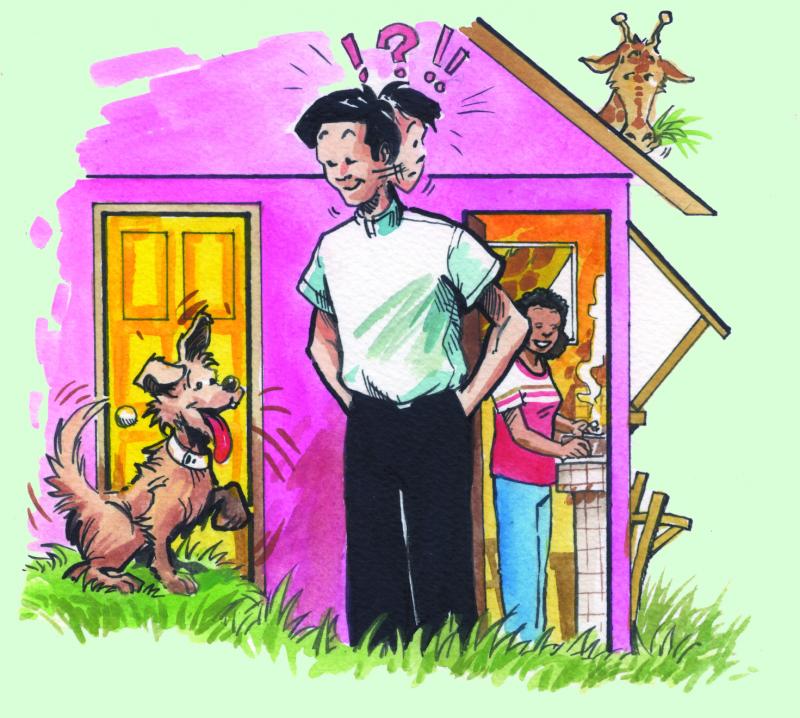
Browny, my lively dog, wagged his tail excitedly while jumping on me, expecting some bones. ‘Browny, you are so smelly!’ I yelled. ‘Yes, Father,’ a voice replied from the kitchen. It was Mary Yaa Abrafi, our cook.
Death's Pride
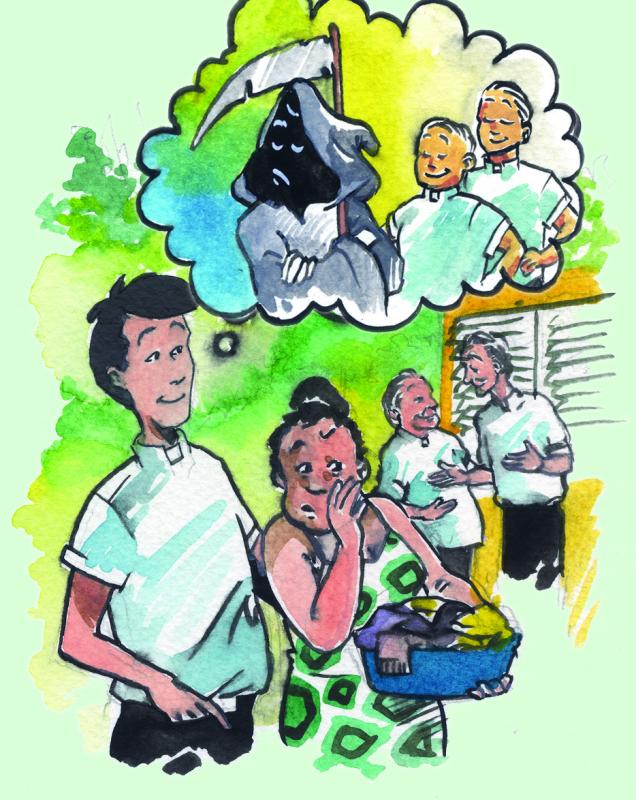
I was with Fr Gregorio Pizarro SVD and Fr Adriano Ocariza, SVD, both blessed with long life, at our SVD Retreat House in Sunnyside, Baguio City. Observing them, the laundry woman whispered to me, ‘Why do you think they are blessed with long life?’ I answered, ‘Maybe because Death said, “Why take them? They are not afraid of me anyway!”’
Mob Dispersal Unit
Coming out of our Mission House at Nsawkaw, Ghana, I saw an old woman with a broom being chased by children and adults who accused her of being a witch. Afraid that the people would surely tear her to pieces, I shouted at the top of my voice, ‘He who runs after a witch will himself become a witch!’ Believe it or not, the pursuers froze to a halt. They started dispersing hurriedly upon seeing me approach.
From the Mouth of Babes
I was asked to help with confessions of Couples for Christ at Vilago Church in Quezon City. After almost an hour, I was quite tired. Suddenly a ten-year-old girl came to confess. What a relief! It was a blessing to hear the little girl’s confession. It helped break the monotonous ‘litany’ of the adults.
Fr Rufus Halley: A Tribute From His Little Brother
By John M. Halley
In July-August last year we published an article by Gaudencio B. Cardinal Rosales, Archbishop of Manila, about his friend ‘Pareng Rufus’, Columban Father Rufus Halley who was murdered in Lanao del Sur on 28 August 2001. Here John M. Halley writes about his older brother, whom he called ‘Rufie’, trying to come to terms with his death, and coming under the influence of Blessed Charles de Foucauld, who so inspired Father Rufus and his friend Cardinal Rosales.
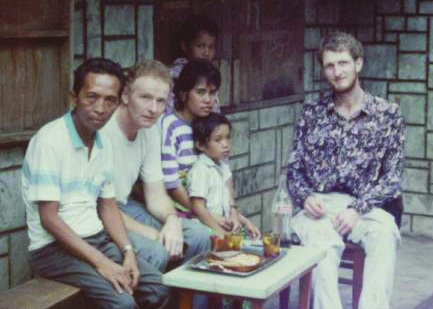
Wary of the special status and privileges sometimes given to Western people in parts of the Philippines, and inspired by the life and legacy of Charles de Foucauld, in the late 80's and early 90's Rufus worked in a Muslim grocery store as a shop assistant. This photo shows Panton (the shop owner), Rufus and members of Panton's family. I am seated on the right.
This is the seventh time that I have tried writing. Perhaps, if I had been able to cry when they were putting Rufie into the earth then I would be able to write this more easily. But my feelings were bottled up then, I couldn’t produce a single tear. They still are bottled up now. But I’m just going to write what comes into my head. To remind myself, I have entitled the file on my PC ‘Final.doc’.
My first vivid memory of Rufie is set in the kitchen of our home in Ireland and I was just six years old. He had a packet of cookies and he offered me one. I said ‘Thanks! Can I take two?’ This made him so angry that he snatched back the cookies and shouted at me ‘Now you won’t have any!’ I bawled with shame and fury but he didn’t care. Walking out of the kitchen, he went to his car and drove off, taking the cookies with him. I can still see his black Morris Minor, through the blur of the tears in my eyes, receding in the distance, impervious to my tears. Later that evening, we met again in the kitchen and I said ‘Could I please have a cookie, I promise I’ll only take one’ and he said ‘Sure, take two.’ I was reformed and so all was forgiven. Right or wrong, Rufus was always my inspiration.
Voice of reason
Fifteen years later he was recanting such a ‘medieval’ approach to correction. In those days we were both in England, I doing my PhD in engineering and he studying Islam in Birmingham. Meanwhile, I had scandalized my family by becoming an evangelical Christian at university. What I kept secret was that in London I had gone further and become involved with an extreme faction of evangelical Christianity, a cult interested only in proselytizing and which insisted everyone else was going to Hell. Under pressure, I agreed with them that all Catholics must go to Hell, including Rufus and the rest of my family. However, I couldn’t have believed it very seriously, since I continued to confide my secrets in Rufus and never in them, until one day I told him all about it. I said that as this cult had been hammering at my defenses they had gained somehow a handle on me. I remember Rufie said only this: ‘A handle? Now that’s not a good thing, when somebody has a handle on you, and wants to use it.’ Though I remain an evangelical Christian, from that moment I never let any grasping organization get a handle on my soul. And I told the cult to get stuffed.
Brotherly complements
Rufus had a different style to me. While I was always impressed with fancy things like glory and martyrdom (I’m still like that, a sucker for the epic picture), Rufie was more practical and preferred funny things. He was forever finding spiritual significance in boring everyday events. He introduced me to the story of Charles de Foucauld, the Frenchman who left Western society to live the life of the unseen Christ in a small village in Muslim North Africa. De Foucauld was killed by gunfire during the First World War. It is still a bit hazy as to why he was killed or by whom. Though de Foucauld was considered a failure in his lifetime, dying without any ‘converts’, he left a big impression on those he met. Today the little Brothers and Little Sisters of Charles de Foucauld are among the most vibrant orders in the Catholic Church, taking monastic vows but living ordinary lives alongside ordinary people. My brother was very excited at the thought of nuns and monks doing proper jobs in factories and sharing serious poverty. Not me. I imagined I could only cope with vows if I could look outside a monastery wall and see beautiful countryside. But a life of chastity in an urban wasteland? That was far too gritty for me. Over the years, Rufie continued to grow closer to the ideas of Charles de Foucauld and I continued to hide from them.
Visions of glory
But when we talked he didn’t entirely deny me the epic splendor I craved. One such moment was the evening he told me of his decision to work in Lanao del Sur. He would be in Marawi, ‘The Islamic City of Marawi’. He said his life would hitherto be dangerous. I was full of excitement. After all, I was young and young people like risky ventures. When he shared with me his vision of dialogue with Islam my enthusiasm grew. I had always had a romantic love of the religion of Mohammed, without ever having met a single Muslim. Maybe I read too much Arabian Nights when I was young! Finally, he told me about the spirituality of the Sufis, about Ibn El-Arabi who had so inspired the young Saladin and about Rabi’ah al Adawiyya who is said to have run through the streets of Baghdad wielding a firebrand and a bucket of water and threatening to burn heaven and drown Hell with these words:
Lord if I love you out of fear of Hell,
throw me into Hell.
And if I should love you in hope
of Paradise, deny me paradise.
And so he went to Marawi. And his gift for being as enthusiastic about everyday things and ordinary people’s preoccupations would make just as much an impression as his love of Islamic philosophy and mysticism, probably more. That was over 20 years ago.
Missing Rufie
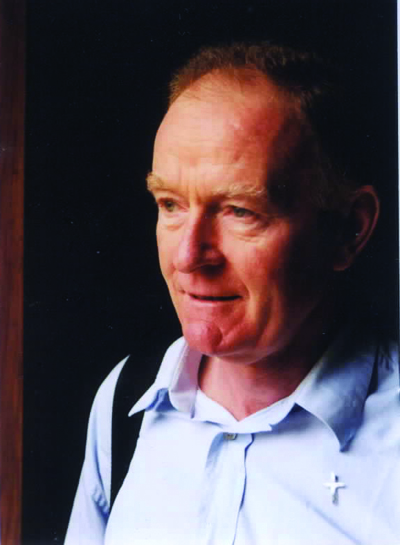
Fr Rufus Halley
What I miss the most is his laughter. There is a kind of humor that thrives between close friends and which is utterly unique to that friendship. As the friendship develops so the dialogue grows with it and also the humor. Eventually you find new things which only that one person will understand and laugh at. Rufus began this process with his humorous view of world events and personalities and as we talked I began to develop a similar capacity. Between us there evolved an alternative history, a joke history of the world. Whenever we met or wrote letters to each other, we updated this history, adding new chapters and new jokes all the time. We spent many happy hours this way. Even now, I will often wake in the still dark hours of the morning inspired by some new connection. I know that only Rufus will get the joke. But Rufus is gone.
Finding peace
That Rufus was murdered is hard, and the hardest part is not knowing why he died or who really wanted him dead. You could call his death ‘martyrdom’ but there is nothing epic or glorious in it now. Sometimes, like in the ‘failed kidnap attempt’ theory, it seems like a sort of glorified accident. But if it really was like that, then my brother shared the death of so many of Mindanao with whom he shared his life. And so I, and others, have been compelled to share the indignity suffered by countless others in this world: to lose a dear one to injustice, to stupidity, to ignorance. As with the death of Charles de Foucauld, there are many times I have been tempted to believe that the sacrifice was pointless. I hear the call for justice and see it swallowed whole by conspiracies of silence and of fear. And this is a bitter pill for me to swallow.
‘Be still before the Lord and wait patiently for him’ (Psalm 37).
Where are those seeds of his work? Bless those robust, cheerful souls who see evidence sprouting all around them like a runaway garden! I haven’t been so lucky. But perhaps it is not the Plan for all of us to see the same things. And I have found some things, little things that start to wash away my bitterness. For example, the work of Charles de Foucauld no longer seems dull and, though it is not my vocation, I do not run from his ideas anymore. Instead they stir in me a longing like the Song of Songs does. Something else happened too. For many years before his death I had found churchgoing difficult. I was so trapped in self-righteousness that the company of other churchgoers was virtually unbearable for me. Then one day, I found myself in church again, and as I looked around I realized that I was no longer irritated by people. That was shortly after my brother’s death and so I see it as his parting gift to me. I believe that God will complete Rufus’ work, and those of us who are willing to wait and to pray may see some of it. But if this experience of mine is any guide, God’s work may be so quiet that we will see very little. Until one strange day we notice that the fear, the hatred, the darkness have moved on. No big bells, no music, just gone.
So Rufie, hear me! Whatever you are up to up there, spare a moment and pray for folks here to understand the meaning of these words: ‘Fools trust in themselves but the wise man puts his faith on solid ground’.
Memory Of The Heart
National Youth Day Experience
8 -12 November 2006 Davao City
By Sr Davidica ‘Bing’ G. Gunao DC
As Youth Coordinator and head of the delegation of the Apostolic Vicariate of Jolo, I experienced God’s manifold graces and blessings through the hospitality, generosity and warm welcome of the Davaoeños in general, our hosts, Assumption Parish, in particular, and specifically my foster-family, through whom God blessed me as their ‘foster-daughter’ together with another nun, Sr Gina FMM.
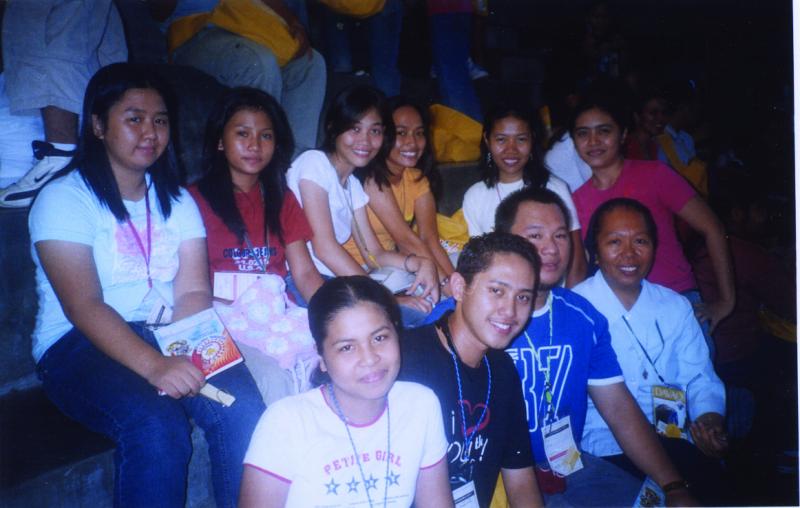
Sr Bing enjoying her 'youth' with some of the delegates
Upon our arrival in Davao, all the youth directors, coordinatorsand youth leaders were welcomed to a hearty NYD thanksgiving lunch at Dencio’s Restaurant. It was sponsored by the Mindanao-Sulu Pastoral Conference (MSPC) Secretariat headed by Fr Eking Lacostales, Regional Executive Secretary, and his staff.
Warm welcome
The warm welcome reception by the Assumption parishionersmade us feel it was our home away from home. The very attentive parishioners were well coordinated and oriented as regards their respective tasks in welcoming their host delegations. Kudos to Fr Frankie de los Reyes SSS, parish priest, and his parishioners, GKK (Gagmayng Kristohanong Katilingban or Basic Ecclesial Communities), host families and drivers, who untiringly and patiently attended to our needs - from fetching us at the airport, bringing us to the catechetical site venue for registration, for our meals, bringing us back and forth and finally seeing us off at the airport again.
The NYD activities, groupings and conferences were very enriching and informative to us delegates. The major theme of the catechesis deepened the faith of our youth delegates. It also allowed them to meet new friends and other youth from all over the Philippines. What was most striking for me was meeting delegates who were Muslims or Lumads (Indigenous people). I even spoke with one of theUlama delegates. ‘Ulama’ is an Arabic word meaning men who are learned in Islam and teach the true meaning of the Q’uran. I was glad to welcome them to such a huge Catholic Youth event.
Pilgrim walk
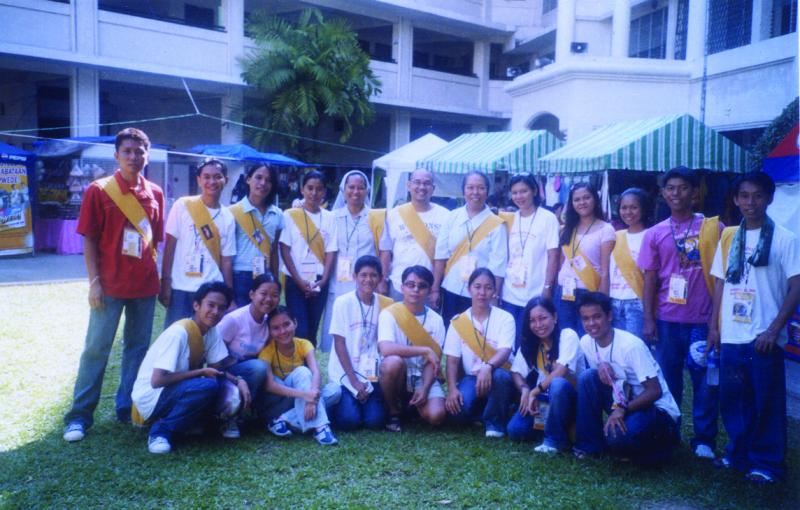
The noontime Pilgrim Walk that started from SM Davao to the Sto Niño Shrine of Prague tested our stamina and endurance. We reached the Shrine, more than 800 meters above sea-level, at 3pm. Some delegates fainted from exhaustion, but they were all right, thanks to the Davao 911 rescue team. Thanks be to God, nobody from our delegation fainted.
The culminating celebrations, the Eucharist, followed by the Youth Jam, were held at the Sto Niño Shrine of Prague, the central venue for the more than 6,000 delegates. Like Jesus, who would go up the mountain to praise, pray and give thanks to God after his busy activities in his ministry, the NYD delegates went up the mountain to pray and thank God for the success of the National Youth Day.
Grateful memories
My foster-family was so kindhearted, very attentive and sensitive to our needs. The couple were working and really busy, but they tried their best to make us feel at home. Even their three children entertained us well. They made our last day together very memorable by bringing us to Eden Paradise Park. They provided us too with durian and other goodies to bring home as pasalubong. My heartfelt gratitude to Ate Leng and Kuya Ding.
For all these and more, I thank our loving and gracious God and our Blessed Mother for her constant maternal protection.
The theme of NYD, ‘Your word is a lamp unto my feet and a light unto my path’, challenged me and every delegate to be a lamp and a light to other youth in our respective places and to let Jesus shine for the rest of our lives. May God be ever blessed.
You may write to:
Sr Bing G. Gunao DC
Vicariate Youth Coordinator
c/o Bishop’s Residence
JOLO, 7400 Sulu
Misyon View
A Simple Witness
In the Philippines , the state views overseas Filipino workers (OFWs) as the country’s new heroes because of their contributions to the economy. They leave their families behind, risk many dangers, and battle loneliness in foreign lands to provide a better life for their families back home.
Women make up many of the hundreds of thousands of OFWs who leave every year. Many of these women migrants work abroad as domestic workers, performing work that frees their employers from the tedious details of everyday life – cleaning, cooking, washing, ironing, minding children, and taking care of the sick or elderly. Because domestic work is not covered by labor laws, many women migrants are vulnerable to abuse and exploitation. Not surprisingly, many women migrants pray for a ‘good’ employer.
Long working hours, inadequate food, and delayed or nonpayment of wages are among the common problems domestic workers face. In addition, the work entails other hazards that inflict private pain. One migrant said that her employer did not even call her by name but instead addressed her as ‘slave-girl’.
Clara was in her early twenties when she decided to work in Singapore. As the eldest in her family, she wanted to help her parents support her younger siblings. Although she had a degree in education, she could not find a job as a teacher in the Philippines ore elsewhere. She prayed for a good employer in Singapore who would not hinder her faith life. Her prayers were answered, as her employer gave her days off on Sundays to attend Mass.
Clara found the work demanding. In addition to doing the household chores, she was entrusted with the household budget and helped the children with their schoolwork. The parents were out most of the time, so, for all practical purposes, Clara was the children’s mother. When her employer’s marriage broke up, she felt responsible for the children, whom she considered family. She had thoughts of working in Hong Kong where salaries were higher, but because her employer and the children had become her family, she stayed on.
The care and concern Clara showed to her family in the Philippines and her ‘family’ in Singapore speak eloquently of the value of everyday acts of kindness and service.
Maruha M. B. Asis, Scalabrini Migration Center , Manila , Philippines
Source: Once Upon a Time in Asia by James Kroeger, p. 43
______________________________________________________________________________________
Fr Fransiskus Madhu SVD, RIP
By Frater Felmar C. Fiel SVD http://fielsvd.blogspot.com/
Our dear Society of the Divine Word (SVD) congregation mourns the death of our young missionary priest from Indonesia, Fr Fransiskus Madhu, SVD, 31, who was shot dead while preparing to celebrate Mass at around 5:30pm on Palm Sunday, 1 April, in Barrio Mabongtot, Lubuagan, Kalinga, in the northern Philippines. Father Fransiskus arrived in the Philippines on Palm Sunday 2005, not long after his ordination.
Father Fransiskus was co-pastor with Fr Gerardo Gudmalin SVD of Saints Peter and Paul Catholic Mission in Lubuagan, part of the Apostolic Vicariate of Tabuk.
The initial report of our Superior General, Fr Tony Pernia SVD, states, ‘Fransiskus was already vested for the afternoon Mass at 5:30 when a man suddenly appeared before him and fired a pistol at him without any apparent motive. It seems that the attacker had personal problems and was wanted by the police. Our young confrere died immediately’. (Later reports said that the weapon used was an M-16, not a pistol.)
The man who shot him was known to have a criminal record.
We, his SVD confreres in Christ the King Mission Seminary, strongly condemn the killing of Father Francis. We hope that the government will do something to give justice to our dead confrere whose only motive was to serve the people of Kalinga in his mission assignment.
Please include him and his murderer in your prayers.
The remains of Father Fransiskus were buried at the Sementeryo ng mga Relihiyoso, at Christ the King Mission Seminary, QC, on Easter Monday, 9 April.
National Youth Day 2006
‘Your Word is the Lamp Unto My Feet and a Light Unto My Path’
By Gracebelle Montecillo
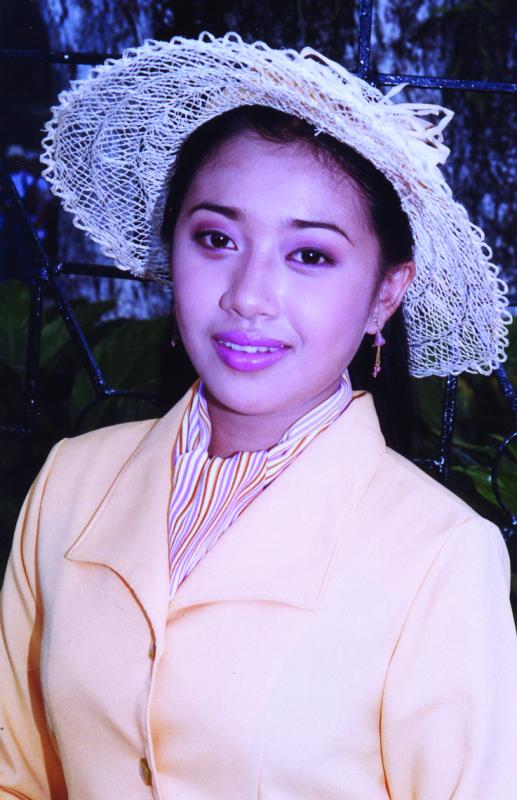
The author graduated in March
from the high school department
of Kabankalan Catholic College
Negros Occidental
When I was 10, I dreamed of one day joining the youth camp that was held annually in our Diocese, Kabankalan. Luckily, the following year, I was allowed to join the parish youth camp and later the diocesan camps. That was the beginning of my desire to reach more than that. When I reached high school, my longing to join youth camps grew deeper. I wanted to learn more about Christian values and share these with my fellow youth.
Last September, when I was nominated as one of the participants for the National Youth Day to be held in Davao City, I was very happy and said to myself, ‘Ayos! Gracebelle, you made it. Thanks be to God!’ But even if I was very excited to go, there were doubts and hesitations on my part. Firstly, I would have to miss my classes. Secondly, this was my first time to go out of the province and I felt nervous. Thirdly, I was financially incapable. My mother is widowed. Yet, with her full support, determination and with the help of my generous benefactors, my dream came true.
Fruit Basket of the Country
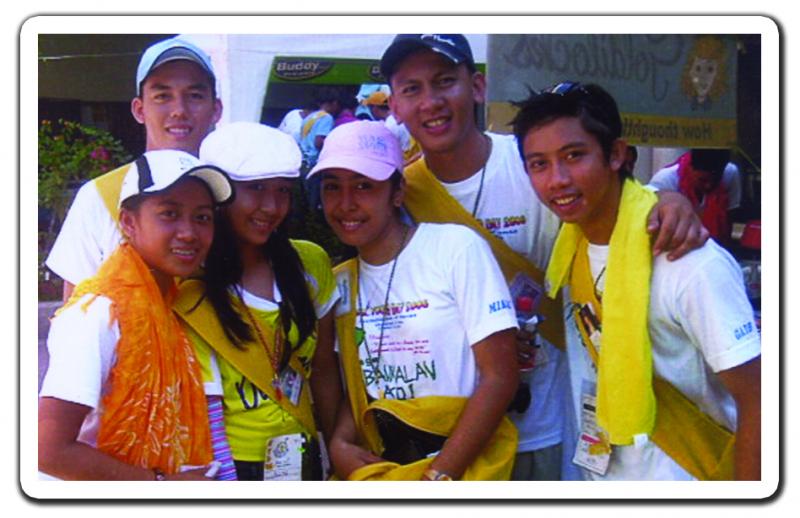
The author extreme left her fellow delegates
At 4am on 6 November 2006 we, the delegates from Kabankalan, together with Fr Marlon Tejada, the school chaplain and director of the Pastoral Ministry Office and the Episcopal Vicar of the Diocesan Youth Commission, left Kabankalan City. We flew from Bacolod to Cebu and then onto Davao City, where we arrived at around 10:30am. The place was really beautiful and peaceful, different from what I thought it would be. Since we arrived earlier than the expected date, the Trinitarian Sisters accommodated us girls and the Alexian Brothers accommodated the boys for the extra two-day stay. They were generous and welcomed us wholeheartedly.
8 NOVEMBER 2006 – the Big Day. Delegates from the different dioceses arrived at the sites – the University of Immaculate Conception, Holy Cross of Davao College and Ateneo de Davao University. These three sites accommodated almost 8,000 young people. We Kabankalanons belonged to Site 2, Holy Cross of Davao College. At 3pm, we had our opening Liturgy followed by a program by the different parishes of Davao welcoming the delegates.
9 NOVEMBER 2006 – first day of the catechesis. The topic was ‘God the Father: Source of True Light’, by Archbishop Antonio J. Ledesma SJ of Cagayan de Oro. During the activity, everybody was surprised and happy when the Papal Nuncio, Archbishop Fernando Filoni, showed up. In the afternoon, there were different topics and conferences in different areas.
The topics were the following:
a. Halika Sabay Tayo (Ecumenism and Inter-Religious Dialogue)
b. Magkakaroon Ka Rin (Youth in the Culture of Absence)
c. Heavenly Do-Re-Mi (Music Ministry)
d. Halina sa Landas ng Puso (A Call to Holiness)
e. Your Choice (Pro- Life)
f. A Foot Forward (Servant Leadership)
g. Ano ba Talaga ang True Love? (Christian Sexuality)
h. Level-up Batan-on (Youth Ministry)
i. Ehem! (Corruption)
j. The Flickering Shadow (A Child in the Media)
k. Back to Basics (Youth in BEC)
l. Atin, Hindi Akin (Justice and Peace and Integrity of Creation)
m. Preaching and Sharing the Word (Creative Gospel Sharing)
In the evening, at around 7, was the Youth Festival. It was our chance to use our God-given talents and to creatively showcase the culture of our place of origin. The delegates of Bacolod showcased the Masskara Festival.
10 NOVEMBER 2006 – second day of our catechesis. The topic for this day was ‘God the Son: The Eternal Light’. This was given to us by Fr Joseph McLaughlin SM. In the afternoon, the participants were given a chance to watch a theater presentation about the life of the Muslim and the Christian. It was about a Peace Talk between the Muslim and the Christian. What a meaningful presentation!
11 NOVEMBER 2006 – last day of our catechesis. We had Fr Cris Violon of the Diocese of Digos on ‘The Holy Spirit: The Source of Truth’. That afternoon, all delegates of the NYD ’06 assembled at the back of SM Davao. We had our pilgrim walk from SM to the Sto Niño Shrine. At the Shrine, Archbishop Fernando R. Capalla of Davao celebrated the closing Mass. In the evening, there was a Youth Jam. That was the time for all the delegates to get to know one another and make friends.
12 NOVEMBER 2006 – was a day spent with our foster families. The Veneracion family, our foster parents, brought us to some historical and beautiful places of Davao. I would like to thank them for the very nice accommodation and for treating us like their own children, showering us with love and concern.
Indeed, the National Youth Day was a big and meaningful event for a simple girl like me to join. It was an exciting, fantastic, educative and reflective activity for the youth, helping us look deeper into our lives, our purpose and our role as Christians.
Our Hideaway

A venue for the youth to express themselves and to share with our readers their mind, their heart and their soul. We are inviting you – students and young professionals – to drop by Our Hideaway and let us know how you are doing.
 Retreat Retreat with God
Retreat Retreat with God
By Athea Myrnette ‘Aia’ Orayle Caspe
The author graduated from high school this year at St Peter’s College of Ormoc.
My recent retreat was really a vacation with God. I did not expect that it would be that good and such a relief.
For the first time, I was able to talk to God wholly in an honest letter to Him. I told Him all my happiness and doubts. After that, my teacher handed each one of us a letter from God. Even though I knew it wasn’t really from God, I really felt thrilled and happy at receiving and reading the letter. What made my heart beat faster was when I started reading it!
The letter was so full of hope, acceptance, mercy and forgiveness, as if He was really able to read my plight in my letter. His letter told me of the blessings I was forgetting to count. I looked back and I seemed to count the bad things more than the good things. Right at that moment, I felt like I was really special and that God had really molded me carefully with His own hands, perfecting each detail with such magnificence.
I realized that I should not humiliate myself, which I often did. I often told myself that I was the ugliest person ever and I couldn’t do any better than others. Even if I would accomplish something big, I still didn’t believe in myself. When somebody appreciated my work, I would just answer with a shrug. Every time I looked in the mirror I asked God, ‘Why did you give me this and that? Why do others have this and that?’ Yes, I was vain and insecure. I even hated myself to the extent that I did not believe in myself anymore, thinking I was the worst person ever.
I really felt guilty and ashamed of what I had been doing. I had disappointed God so much. I did not even appreciate what He had given me since birth. I forgot the simple things that satisfied my heart best. I have everything I need — my naturally bejeweled eyes, my nose through which I breathe, my ears that can listen to those soft baby cries, my lips which can console a broken heart, myself that can inspire others and all the other graces I receive everyday. There is no need to crave for more. God made me special and unique.
God doesn’t make junk on earth. Each of us is beautiful, each a sacred vessel in His image. Just knowing that I am made in His own image makes me feel proud and say, ‘God made me and He loves me. I am special.’
It was a very fruitful retreat. I hope there will be more retreats to come because I still have more lessons to learn which I can only learn by retreating . . . with GOD!
Send us your story (500 to 1,000 words) to PO Box 588, 6100 Bacolod City
or email it to us at editor@misyononline.com Don’t forget your picture. It makes the difference.
Peace by Peace

If we have no peace, it is because we have forgotten that we belong to each other. – Mother Teresa
***
ABORTION THE GREATEST
DESTROYER OF PEACE
– Blessed Mother Teresa
‘But I feel that the greatest destroyer of peace today is abortion, because it is a war against the child – a direct killing of the innocent child – murder by the mother herself. And if we accept that a mother can kill even her own child, how can we tell other people not to kill one another? How do we persuade a woman not to have an abortion? As always, we must persuade her with love, and we remind ourselves that love means to be willing to give until it hurts. Jesus gave even his life to love us. So the mother who is thinking of abortion, should be helped to love – that is, to give until it hurts her plans, or her free time, to respect the life of her child. The father of that child, whoever he is, must also give until it hurts. By abortion, the mother does not learn to love, but kills even her own child to solve her problems. And by abortion, the father is told that he does not have to take any responsibility at all for the child he has brought into the world. That father is likely to put other women into the same trouble. So abortion just leads to more abortion. Any country that accepts abortion is not teaching the people to love, but to use any violence to get what they want. That is why the greatest destroyer of love and peace is abortion’. <www.gargaro.com/mother_teresa/quotes.html>
***
Pro-Life Philippines
www.prolife.org.ph is the website of Pro-Life Philippines which received two of the Catholic Mass Media Awards for 2006. One, the Jaime Cardinal Sin Serviam Award for Individuals, went to Sr Mary Pilar Verzosa RGS, and the other, the Jaime Cardinal Sin Serviam Award for Institutions, to Pro-Life Philippines Foundation, Inc.
***
A Tremendous Event
Dorothy Day
Even the most hardened, the most irreverent, is awed by the stupendous fact of creation. No matter how cynically or casually the world may treat the birth of a child, it remains spiritually and physically a tremendous event.
***
First keep the peace within yourself,
then you can also bring peace
to others. –Thomas Jefferson
***
Peace is not the product
of terror or fear.
Peace is not the silence
of cemeteries.
Peace is not the silent result
of violent repression.
Peace is the generous,
tranquil contribution
of all to the good of all.
Peace is dynamism.
Peace is generosity.
It is right and it is duty.
– Oscar Romero
***
Former Bishop of Dili, East Timor, Carlos Filipe Ximenes Belo
1996 Nobel Peace Prize Awardee
‘Some scientists believe there is something in the human person deeper than ethics and reason. We have the capacity to be moved by the suffering of others. This inherent power serves as the foundation for respect for others and the relief of their suffering. Humans are compassionate beings.’
***
Detachment From Things
Thomas Merton
The importance of detachment from things, the importance of poverty, is that we are supposed to be free from things that we might prefer to people. Wherever things have become more important than people, we are in trouble. That is the crux of the whole matter.
***
The importance of the family meal
Research by the National Center on Addiction and Substance Abuse at Columbia University consistently finds the more often children eat dinner with their families, the less likely they are to smoke, drink or use drugs. (www.gracebeforemeals.com)
***
There never was a
good war or a bad peace.
– Benjamin Franklin
***
How to ‘destroy’ our enemies
‘When Abraham Lincoln was criticized for being too courteous to his enemies, and reminded that it was his duty to destroy them, he gave a lovely reply: Do I not destroy my enemies when I make them my friends? ’
Fr Paul Andrews SJ
The Sacred Heart Messenger, April 2007
***
It is requisite for the relaxation of the mind that we make use, from time to time,
of playful deeds and jokes. – Thomas Aquinas
Sacramentum Caritatis, ‘The Sacrament Of Charity’.
On 22 February Pope Benedict XVI signed Sacramentum Caritatis,
‘The Sacrament of Charity’. The document is his distillation of
and response to the Synod on the Eucharist held in the Vatican, 3-23 October 2005. Part One is a reflection on ‘The Eucharist, a Mystery to be Believed’, Part Two on ‘The Eucharist, a Mystery to be Celebrated’ while Part Three is on ‘The Eucharist, a Mystery to be Lived’. The document shows how the Eucharist is linked with every aspect of Christian life.
In paragraph 92, in Part Three, the Holy Father writes on ‘The sanctification of the world and the protection of creation’. We can read Father Seán McDonagh’s article in the light of this. We can also use these Scripture texts as a background: Genesis 1:1-2:25 and Psalm 104 (103). The Catechism of the Catholic Church, Nos 2415-2418, is also good to read. Though among scientists there are different interpretations of the causes of global warming and of its consequences, Christians, as individuals or community, cannot take God’s creation for granted.
Here is what Pope Benedict wrote:
Finally, to develop a profound eucharistic spirituality that is also capable of significantly affecting the fabric of society, the Christian people, in giving thanks to God through the Eucharist, should be conscious that they do so in the name of all creation, aspiring to the sanctification of the world and working intensely to that end. The Eucharist itself powerfully illuminates human history and the whole cosmos. In this sacramental perspective we learn, day by day, that every ecclesial event is a kind of sign by which God makes himself known and challenges us. The eucharistic form of life can thus help foster a real change in the way we approach history and the world. The liturgy itself teaches us this, when, during the presentation of the gifts, the priest raises to God a prayer of blessing and petition over the bread and wine, ‘fruit of the earth’, ‘fruit of the vine’ and ‘work of human hands’. With these words, the rite not only includes in our offering to God all human efforts and activity, but also leads us to see the world as God’s creation, which brings forth everything we need for our sustenance. The world is not something indifferent, raw material to be utilized simply as we see fit. Rather, it is part of God’s good plan, in which all of us are called to be sons and daughters in the one Son of God, Jesus Christ (cf. Eph 1:4-12). The justified concern about threats to the environment present in so many parts of the world is reinforced by Christian hope, which commits us to working responsibly for the protection of creation. The relationship between the Eucharist and the cosmos helps us to see the unity of God’s plan and to grasp the profound relationship between creation and the ‘new creation’ inaugurated in the resurrection of Christ, the new Adam. Even now we take part in that new creation by virtue of our Baptism (cf. Col 2:12ff.). Our Christian life, nourished by the Eucharist, gives us a glimpse of that new world – new heavens and a new earth – where the new Jerusalem comes down from heaven, from God, ‘prepared as a bride adorned for her husband’ (Rev 21:2).
The full text of Sacramentum Caritatis is online at www.vatican.ie
www.vatican.va/holy_father/benedict_xvi/apost_exhortations/documents/hf_ben-xvi_exh_20070222_sacramentum-caritatis_en.html
The Black Belt To White Collar
By Gee-Gee and Miggy Dimayuga
Father Leo E. Patalinghug, born in Cataingan, Masbate, is an associate pastor of St John’s Parish in Westminster, Maryland (www.sjwest.org). He is also the chaplain of the Cursillo Movement in the Archdiocese of Baltimore (www.archbalt.org). He’s a renowned speaker among youth groups and on college campuses. He uses his expertise in martial arts (Tae Kwon Do and Arnis) and even breakdancing to bring the Word of God to the youth.

Photo: Mary Ann Wyand © The Criterion
Gee-Gee Torres Dimayuga, the assistant editor of Misyon, has migrated to the USA with her husband, Miggy, and is working for Misyon from there via the internet. Gee-Gee and Miggy interviewed Fr Leo shortly after moving to the USA.
Every day is an opportunity for mission. No one knows this more, I suppose, than our dear Editor, Father Seán Coyle, himself. My husband and I moved to the USA in October and were in Maryland for two months before eventually settling in Atlanta, GA. While we were in ‘Mary’s land’, the state named after Queen Henrietta Maria, wife of King Charles I of England at the time of its founding in 1632, Father Seán saw and seized an opportunity for mission. He had read of a Filipino-born priest with a passion for working with the youth and a missionary focus on revitalizing the American family. I received my special assignment to interview Fr Leo Patalinghug who is based in Maryland.
I felt excited when I received Father Seán’s email, but at the same time, nervous. I hadn’t done any interviews since my visits to Filipino missionaries in Thailand, Cambodia, Vietnam and Korea between 1998 and 2000.
Westminster was about an hour and a half north of Montgomery Village, where we were staying. Miggy and I decided to leave the house early, at around 6am, as we’d never been to Westminster and didn’t want to be late for our 9am appointment. It was raining that morning, but just enough to make it a cool day for a drive. The directions we had took us through the narrow, but well-paved, back-roads of Maryland. We had a leisurely drive through farmlands and large estates which reminded me of our farm back home in Negros. Despite the soothing views outside our car windows, anxiety was building inside me about the forthcoming interview.
Arriving in Westminster an hour before our appointment, we went to get a bite to eat. At 8:45am, we proceeded to St John’s parish office and rang the doorbell. A friendly staff member let us in and called Father Leo. In a moment, Father Leo appeared with a big smile and warm welcome. His affable personality washed away any nervousness or anxiety I had. We went to his quite large but simply-appointed office and he offered us drinks. Father Leo led us in prayer and we began the interview. This is his story.
‘If you’re going to church and you don’t know why, come to one night of the mission and if you don’t want to go to church after that, you don’t have to go.’
‘A very bold move’, said the erudite college freshman to himself. Leo was a good student but a bit too cynical for his youth. Although brought up in a very conservative Filipino family, he was becoming detached from his faith. For him, the Mass had degenerated into an obligation and held little meaning for him. When he heard the challenge above from a preacher in his home parish he was intrigued. Little did he know it then, but his cynicism had led him on the road to his conversion.
He went to the mission talk as an ‘uninterested spectator’. Somehow, God worked through this preacher and a spark lit in Leo’s heart. ‘The preacher explained the Mass, beginning from why we make the sign of the cross; what it really means - its history, its origin; why we have candles; what the penitential rite is. He showed the symbolisms and pointed to the Passover and how Christ continues to live today’. The speaker taught him how to be an active participant in the Mass, as what Vatican II calls each Catholic to be. The priest’s words resonated with something deep inside the college youth. ‘When he lifted up the Sacred Host, the Body of Christ’, Leo continued, ‘I sobbed! That’s the only way I can describe it. Tears were coming down my face and I just knew that God was serious. I started to take prayer seriously’.
Leo began to integrate prayer in his daily routine. He was a black belt in Tae Kwon Do and in Arnis, and would run miles to train for competitions. ‘I would pray the rosary because it was a good way to keep pace’. He would wake up early in the morning to attend Mass before going to his college classes. Leo was involved in a lot of extra-curricular activities, even working as a life-guard a few times a week. In all this, however, he would always start the day with a little prayer. ‘I just started realizing that the Church was important to me’, he reflected. ‘Maybe it was because of my parents’ strict upbringing and making sure we had that solid foundation’.
It was a gradual process – a transformation. He was 19-years-old when he went on pilgrimage to Medjugorje in Bosnia-Herzegovina. It was there that he started to think to himself, ‘You’re kidding! I’m supposed to be a priest?!’ He pushed the thought aside for many years.
Leo lived the college life and kept busy. He had a girlfriend, remained heavily involved in the family business, a martial arts school, and teaching debate at a nearby La Salle school. He also started delving into Church-related activities. Leo was involved with music ministry with the LifeTeen program (www.lifeteen.com), prayer groups, youth events and even teaching catechism in Sunday school. ‘I was doing a lot’, Leo admitted. ‘But it kept me away from trouble.’
In one of the youth seminars he was directing, he saw several seminarians. ‘They were in their Roman collars – young, excited and joyful!’ There was something they had that captivated Leo. ‘I was a little jealous’, he admitted. ‘I thought my professional career would take me into either media or law, but I started to think that maybe I could do youth ministry’.
Although he got more and more involved in Church activities, he still wasn’t satisfied. He prayed deeply and looked around at different religious groups. All along, his parents knew he was becoming more religious, but they didn’t really know any details. One day, his parents asked him, ‘Why aren’t you dating anymore?’ His brothers and sisters knew something was happening but they didn’t really know the extent of it. He kept his search very much to myself.
A year and a half after college, he made one of the most memorable phone calls in his life. He called the vocation director in their diocese. ‘I began babbling on the phone’, Father Leo recalled. The vocation director paused, saying, ‘Why don’t you start by telling me your name?’ Leo again fumbled his words. The vocation director prompted, ‘Did you call because you think you have a vocation in the priesthood?’ Leo was stunned. ‘How did you know that?!’ he exclaimed! The answer came quite matter-of-factly, ‘Because you called the vocation office’.
As soon as Leo met the vocation director, he felt a great sense of peace. When he came home, he told his parents where he had been. His mom, a devout Catholic, began to cry with joy. Leo told her that his visit didn’t mean he was going to be a priest. He still kept denying it. ‘But strangely’, he remembered, ‘when the vocation director gave me the application form, I was done very quickly with it. I got more and more excited with the thought of becoming a priest. One thing led to another. After a whole bunch of interviews, the bishop and the review board finally accepted me. I left for the seminary. I was 23’.
Father Leo Patalinghug was ordained a priest on 5 June 1999 and celebrated his first Mass was on the Feast of Corpus Christi that year.
Father Leo has his own website, www.gracebeforemeals.com, that tells us, among many other things, how he hopes to present a TV series based on the family meal on PBS (www.pbs.org), a TV/radio network in the USA supported by public subscriptions. We hope to have more on this from Father Leo himself in a future issue.
You may write Fr Leo Patalinghug at: St John Catholic Church, 43 Monroe Street, Westminster, MD 21157, USA .
You may email him at fatherleo@gracebeforemeals.com.
The Door To The Deepest Longing
By Chester Jay R. Tolentino

Chester Jay and his Family
On 23 December 2006 at 10:51am, while I rested in my room, a former student, a friend, texted me asking, ‘Sir Ches, y s dr a nid 2 b moral?’(Why is there a need to be moral?)
At that moment I felt joy because a person I had been praying for had come to seek a deeper meaning to life. I prayed before replying, ‘To live a moral life is a reason of our existence, the beginning of true peace and freedom. A person who chooses to be immoral will be cut off from the source of goodness, GOD – who is Goodness Himself. Today, people are unaware of the source of the miseries they encounter. They fail to realize, it’s because they live in sin, our real problem’.
She then requested that I write an essay about the need to be moral for her to have a basis for her reflection paper. I replied, ‘I will! Pray that the Holy Spirit may guide me so that it would be free from error.’
From that time on, I considered writing an article regarding that question and asked for guidance in prayer.
Search for Happiness
I had read numerous books regarding morality but didn’t have these resources with me. Some of these were the CATECHISM of the CATHOLIC CHURCH (CCC) with its authoritative teachings and explanations, the exemplary encyclical of our late Pope John Paul II, VERITATIS SPLENDOR (The Splendor of Truth), and the works of St Augustine and many other saints. I had to trust the Holy Spirit for what I was planning to write. Beforehand, I was thinking of referring to those excellent books for her to read but in my heart, there was a prompting to write. I asked inspiration from the Holy Spirit Who finally guided me to write this article at 10 o’clock in the evening.
‘Why is there a need to be moral?’ is a question at the heart of every man even if he is not really that aware of it.
St Augustine confessed, ‘And yet this man, this minute part of Your creation, desires to praise You. You have made us for Yourself, and our hearts are restless until they rest in You.’
No wonder everyone is seeking for true happiness in life. We all desire freedom but most of the time we don’t really find what we are looking for. We strive too hard to have wealth, fame and power but when we get there or have it, why are we still empty and looking for something more or better? Others might see that we acquire good things and are blessed, but are we really? Only our hearts can tell, not even our intellect, because many times our mind deceives us.
How do we save our soul?
The capacity of our hearts to accept God’s grace is so immense that it could surely contain the Uncontainable – God Himself – when we are disposed. Who could ever imagine this, that our hearts could only be filled with created things? Of course not! Even if you possess all things you will never have enough because a person who is not filled with God totally is incomplete. As Scripture says, ‘What does a man profit if he gains the whole world, but loses his soul?’
If God alone is what we need to be fulfilled then why is there still a need to be moral?
Let us learn from the experience of our Lord Jesus, in the account of the ‘Rich Young Man’ in the gospel of Mark 10:17-22, a man who represents all of us, the longing of our hearts.
Road to happiness
The man asked, ‘Good Teacher, what must I do to inherit eternal life?’ This question, which cannot be disregarded even by the richest, most famous or the most powerful man in the world, is a reality in the soul of everyone. This is a question that resounds always in the recesses of our heart – eternal life. ‘What must I do to be happy?’ ‘How should I act or strive to be loved and listened to?’ ‘I need somebody to give me care and attention for me to experience true happiness’. What do we feel when we are ‘cut off’ from our loved ones?
Jesus then replied, ‘Why do you call me good? No one is good but God alone!’
Understanding goodness
‘Why do you call me good?’ is a question originating from the goodness of God Himself that we can perceive through our senses from His creation. Most of the time, we focus on what is good in creation but forget its source. Why do we seek education? Is it not because it is good? Why do we spend our time in pursuit of wealth and money? Of course, because it is good. When God created the Universe, as we read in the Book of Genesis, He saw that it was good.
But Jesus added, ‘No one is good but God alone’. When we focus in having wealth or enjoyment in creatures, they will exclaim to us, ‘We are not God. ‘We are not good in ourselves. We are not the end . . .’ That’s why when our mind and will are directed on created things, our morality will be affected because created things in themselves without God wither and perish.
God is the One who must be sought alone in Himself and through His Holy presence in creation. If we seek not Him, our hearts will be restless because created things are never enough. A person who doesn’t love his Creator alone will seek affection and amass things just to appease his own heart, which they can never do. The more he seeks aside from God, the more he is deprived, because his endeavors will turn to vanity unless God delivers him.
When man seeks for something more to fill himself, pride, greed, avarice, gluttony, envy, lust, anger and sloth come in. The capital sins deceive and mislead us to turn our backs on ‘No one is good but God alone’.
So that we don’t stray
Jesus continued, ‘You know the commandments: Do not commit adultery. Do not steal. Do not bear false witness. Do not defraud. Honor your father and your mother’.
When we are misled, sin comes. Sin weakens our relationship with God, separating us from His merciful love. The Ten Commandments are given to us not merely as ‘dos and don’ts’ but as a loving admonition from God for us not to be separated from Him, who is the Source of all good. They are the infallible guide to morality because their essence is applicable at all times and to all generations.
When we choose to depart from God’s commands, we choose to sin. We separate ourselves from God, depending upon the gravity of our acts. Then, a person becomes restless and miserable. The one who is in this state will have no good in himself because he is cut off from the source of goodness. He has chosen the created rather than the Creator. Not everything that God has created, however good, will always be good for every man. ‘You may eat any tree in the Garden but not the tree in the center’. It is a command towards charity – a limitation that leads to freedom.
When we violated the command ‘Do not eat it for you will surely die’ we were stripped of Life, of God Himself. So we became naked and hid from God because of our own negligence and weakness. The original dignity we had was lost, not because God willed it, but through our own fault.
How then can you be truly happy when you have no life in you because Life Itself does not dwell in you? We can try to show to others that we are happy by assuming or projecting a happy appearance but we can never deny what is contained in our hearts.
There is a need to be moral at all times so that we can receive the grace of God.
This is but a door . . . the beginning of true happiness . . .
To paraphrase a quote from St Augustine, ‘To be free from crimes such as murder, adultery, theft, etc, is not yet freedom in itself, just the beginning of true freedom’.
True peace and happiness are real. I am a witness to this.
After reading this, Duc in altum . . . Put out into the deep . . .
God Bless You. . . .
Amen.
You may email the author at chesterjay333@yahoo.com.ph.
The Story Of A Pig
By Sr Tammy Saberon SSC
Sister Tammy, from Molave, Zamboanga del Sur, helped to prepare the way for the return of the Columban Sisters (www.columbansisters.org) to Myanmar. They had been forced to leave in the early 1960s when the country was still known as Burma.
It was St Columban’s Day, 23 November 2001 in a small village

Pig for St Columban's Day
of Myitkyina, Myanmar. I was warmly welcomed in the Village of Edin. The people had very little to live on and yet they gave a simple party for me and some money too. I was touched by their generosity. Looking at the simple meal of rice and beans they had for the party, I thought of buying a piglet from the money they gave me. The amount I received from them was just enough to buy a piglet from the FMM Sisters. I bought the biggest one and asked the student-catechists to raise it for me for the next year’s St Columban’s Day. The students were very willing to feed it. Nobody knew that the money I had used to buy the pig was from the villagers.
St Columban’s Day 2002 came and it was arranged that there would be a celebration with everybody invited. It was known that I had a pig to be butchered. I was a bit disappointed that it had not grown as big as I had expected. People said it would not be enough to feed the whole village but they assured me that everyone would get a share of it and of the two sacks of rice that I had bought that afternoon.
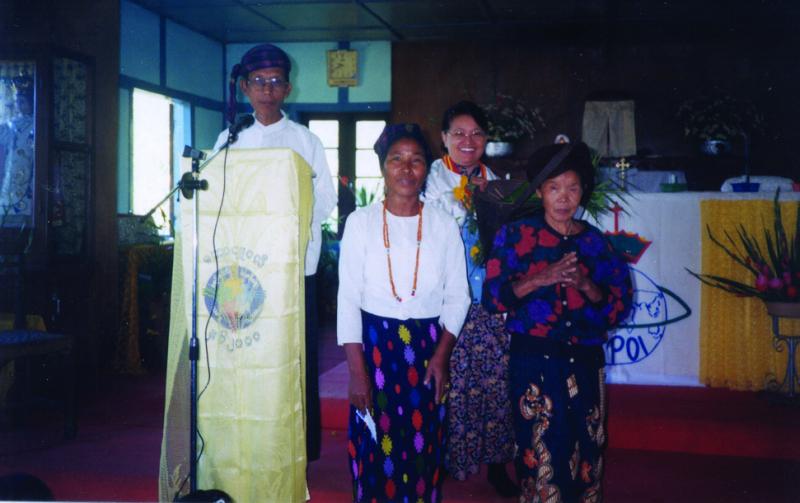
Sr Tammy receiving her gifts gathered in a tribal
basket. Myanmar's traditional way of giving
gifts
St Columban’s Day that year was also the feast of Christ the King and Thanksgiving, a harvest festival. Early in the morning the women were already in the catechists’ kitchen to cook for the feast day. The women put the meat and sauce on the rice and wrapped it in banana leaves. These packed meals would be distributed to the people after Mass. What was beautiful and touching was the community spirit they had shown. There were volunteers who gave tomatoes, onions, garlic, banana leaves and firewood.
The Mass was celebrated by Fr Steven from the pre-major seminary and concelebrated by Fr Yawhan, the director of the catechetical school. After Mass, there were gift offerings for me, for the other congregations and the priests. Then I was asked to say a few words. After a few greetings, I told the people about the secret — that the pig we slaughtered for the feast was bought from the money they gave me the year before and that it was not my pig but ‘our pig’. I was apologetic though that it did not grow as big as I had expected and so it was too small for the whole crowd. Spontaneous laughter from the congregation followed. I went on to say that with the gifts they just gave me, maybe we could buy two piglets for the next year’s celebration. When I counted the money, it was indeed enough to buy two. God willing, we’d have a bigger celebration the following year.
After all the speeches were over, the people got their meals packed in banana leaves. Everybody, children and adults, got at least two packs of the meal. They went home very happy. There were leftovers and so some of them had more to bring home. The celebration was simple but joyful and meaningful.
In 2001 I was the only Columban to celebrate the feast but in 2002 Fr Colm Murphy was with me. He was on a three-month stint teaching English at the pre-major seminary before proceeding to Pakistan where he’s assigned. In 2004 four Columban Sisters, Sr Mary Ita O’Brien and Sr Mary Dillon, both Irish, Sr Susanna Choi, a Korean, and Sr Winnie Apao, a Filipina, joined me to re-establish a community of Columban Sisters in Myitkyina and to celebrate St Columban’s Day with the people.
To Search is to Find

We do not have the answers to every question – maybe only a partial answer that could set you in the right direction. But the very asking of the question is the beginning of the answer. So why don’t you send us your questions and together we will search.
Last January Archbishop Jesus A. Dosado CM of Ozamiz ordained Columban Father Jovito Dales to the priesthood. Young readers often ask how they can know if God is calling them to the priesthood or religious life and how they can prepare to live such a life. On 17 February Pope Benedict met with seminarians of the Roman Major Seminary and they asked him some questions related to those topics. Here are some of the questions along with the Pope’s answers. These have been slightly edited.
HOW DOES GOD SPEAK?
Gregorpaolo Stano, Diocese of Oria (First-Year Philosophy): Your Holiness, ours is the first of two years dedicated to discernment, during which we are taught to make a profound personal examination. It is a tiring exercise for us, because the language of God is special, and only those who are attentive are able to discern it among the thousands of voices clamoring inside us. We are asking you, therefore, to help us to understand how God talks in practice and what clues he gives you in his private pronouncements?
Pope Benedict XVI: How can we distinguish God's voice from among the thousands of voices we hear each day in our world? God speaks with us in many different ways. He speaks through others, through friends, parents, pastors, priests. Here, the priests to whom you are entrusted, who are guiding you.
He speaks by means of the events in our life, in which we are able to discern God's touch; he speaks also through nature, creation, and he speaks, naturally and above all, through his Word, in Sacred Scripture, read in the communion of the Church and read personally in conversation with God.
It is important to read Sacred Scripture in a very personal way, and really, as St Paul says, not as a human word or a document from the past as we read Homer or Virgil, but as God's Word which is ever timely and speaks to me. It is important to learn to understand in a historical text, a text from the past, the living Word of God, that is, to enter into prayer and thus read Sacred Scripture as a conversation with God.
St Augustine often says in his homilies: I knocked on various occasions at the door of this Word until I could perceive what God himself was saying to me. It is of paramount importance to combine this very personal reading, this personal talk with God in which I search for what the Lord is saying to me, and in addition to this personal reading, reading it in the community is very important because the living subject of Sacred Scripture is the People of God, it is the Church.
This Scripture was not simply restricted to great writers – even if the Lord always needs the person and his personal response – but it developed with people who were traveling together on the journey of the People of God and thus, their words are expressions of this journey, of this reciprocity of God's call and the human response.
Thus, the subject lives today as it lived at that time so that Scripture does not belong to the past, because its subject, the People of God inspired by this same God, is always the same, and therefore the Word is always alive in the living subject.
It is consequently important to read Sacred Scripture and experience Sacred Scripture in the communion of the Church, that is, with all the great witnesses of this Word, beginning with the first Fathers and ending with today's saints, with today's Magisterium. [Editor’s note, this means the teaching office of the Church, consisting of the Pope and Bishops.]
Above all, it is a Word that becomes vital and alive in the Liturgy. I would say, therefore, that the Liturgy is the privileged place where every one of us can enter into the ‘we’ of the sons of God, in conversation with God. This is important. The Our Father begins with the words: ‘Our Father’; only if I am integrated into the ‘we’ of this ‘Our’ can I find the Father; only within this ‘we’, which is the subject of the prayer of the Our Father, do we hear the Word of God clearly.
Thus, this seems to me most important: the Liturgy is the privileged place where the Word is alive, is present, indeed, where the Word, the Logos, the Lord, speaks to us and gives himself into our hands; if we are ready to listen to the Lord in this great communion of the Church of all times, we find him. He opens the door to us little by little.
I would say, therefore, that this is the focus for all the other points: we are personally directed on our journey by the Lord, and at the same time we live in the great ‘we’ of the Church, where the Word of God is alive.
Moreover, other points are associated with it: listening to friends, listening to the priests who guide us, listening to the voice of today's Church; hence, listening to the voice of the events of this time and of creation which become decipherable in this profound context.
To sum up, therefore, I would say that God speaks to us in many ways. It is important to be in the ‘we’ of the Church, in the ‘we’ of the life of the Liturgy. It is important that I personalize this ‘we’ in myself; it is important to be attentive to the other voices of the Lord, also letting ourselves be guided by the people who have experience of God, so to speak, and help us on this journey, so that this ‘we’ becomes my ‘we’, and I become one who truly belongs to this ‘we’.
Thus, discernment grows, and personal friendship with God grows, the capacity to distinguish God's voice among the thousands of voices of today, which is always present and always speaks with us.
UNDER CONSTRUCTION
Gianpiero Savino, Diocese of Taranto (First-Year Theology): In the eyes of most people we might appear as young men who say their ‘yes’ firmly and courageously and leave everything to follow the Lord; but we know that we are far from being truly consistent with that ‘yes’. Trusting as sons, we confess to you the partiality of our response to Jesus' call and the daily effort of living a vocation that we feel is propelling us along the path of the definitive and the total. How can we respond to such a demanding vocation as that of shepherds of God's holy People while being constantly aware of our weakness and inconsistencies?
Benedict XVI: It is good to recognize one's weakness because in this way we know that we stand in need of the Lord's grace. The Lord comforts us. In the Apostolic College there was not only Judas but also the good Apostles; yet, Peter fell and many times the Lord reprimanded the Apostles for their slowness, the closure of their hearts and their scant faith. He therefore simply shows us that none of us is equal to this great yes, equal to celebrating ‘in persona Christi’, ‘in the person of Christ’, to living coherently in this context, to being united to Christ in his priestly mission.
To console us, the Lord has also given us these parables of the net with the good fish and the bad fish, of the field where not only wheat but also tares grow. He makes us realize that he came precisely to help us in our weakness, and that he did not come, as he says, to call the just, those who claim they are righteous through and through and are not in need of grace, those who pray praising themselves; but he came to call those who know they are lacking, to provoke those who know they need the Lord's forgiveness every day, that they need his grace in order to progress.
I think this is very important: to recognize that we need an ongoing conversion, that we are simply not there yet. St Augustine, at the moment of his conversion, thought he had reached the heights of life with God, of the beauty of the sun that is his Word. He then had to understand that the journey after conversion is still a journey of conversion, that it remains a journey where the broad perspectives, joys and lights of the Lord are not absent; but nor are dark valleys absent through which we must wend our way with trust, relying on the goodness of the Lord.
Therefore, also the Sacrament of Reconciliation is important. It is not correct to think we must live like this, so that we are never in need of pardon. We must accept our frailty but keep on going, not giving up but moving forward and becoming converted ever anew through the Sacrament of Reconciliation for a new start, and thus grow and mature in the Lord by our communion with him.
It is also important of course not to isolate oneself, not to believe one is capable of going ahead alone. We truly need the company of priest friends and also lay friends who accompany and help us. It is very important for a priest, in the parish itself, to see how people trust in him and to experience in addition to their trust also their generosity in pardoning his weaknesses. True friends challenge us and help us to be faithful on our journey. It seems to me that this attitude of patience and humility can help us to be kind to others, to understand the weaknesses of others and also help them to forgive as we forgive.
It seems to me that we must have trust in God’s gift of perseverance, but we must also pray to the Lord with tenacity, humility and patience to help and sustain us with the gift of true ‘definitiveness’, and to accompany us day after day to the very end, even if our way must pass through dark valleys. The gift of perseverance gives us joy, it gives us the certainty that we are loved by the Lord, and this love sustains us, helps us and does not abandon us in our weakness.
[Translation of Italian original issued by the Holy See] Copyright 2007 - Libreria Editrice Vaticana
Visit our Misyon website and send us your feedback
Email us at editor@misyononline.com
Your Turn

The author is currently a fourth year student at St Scholastica's College, Manila. She shares what lessons she had gleaned from an article we featured in our January - February 2007 issue. We welcome our readers' comments, reflections and realizations on the stories we feature.
Dear Father Seán Coyle,
PAX!
I want to share my thoughts on one of the articles in the January-February 2007 issue of Misyon, New Year in February.
From what I read, the article was about a Filipina who struggled with the fact that she couldn't be with her loved ones because she was on missionary work. But she chose to endure the pain, heartaches and feelings of loneliness because she believed that God wanted her to be there. That was God's plan for her, and because she was loyal and faithful, she said ‘yes’ to God, just as Mary did.
The most significant learnings I gained from the article were the ‘three lessons’ that the author herself wanted to share. The first lesson: we should learn to be open to anything and everything, especially things that can help us grow in God's love. The second lesson: there's always a grain of goodness in each person; we have no right to judge other people. The third lesson: mission is not a one-way but a two-way path. Through giving, missionaries (even us non-missionaries) can in turn receive.
Thank you for taking the time to listen to my thoughts. Keep up the good work, more power and God bless!
Giselle Manahan
St Scholastica's College
Email: gie_19_spongebob@yahoo.com.